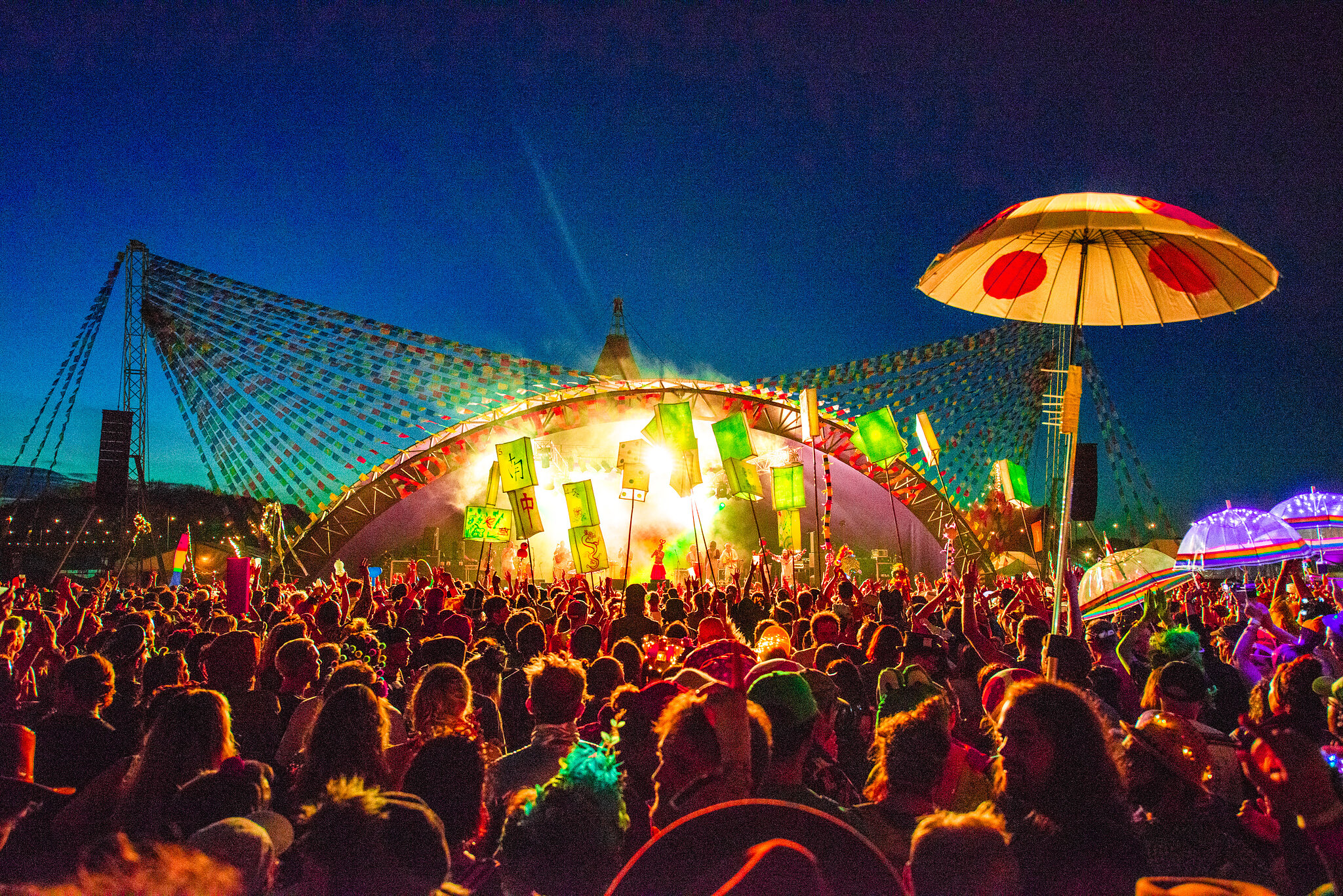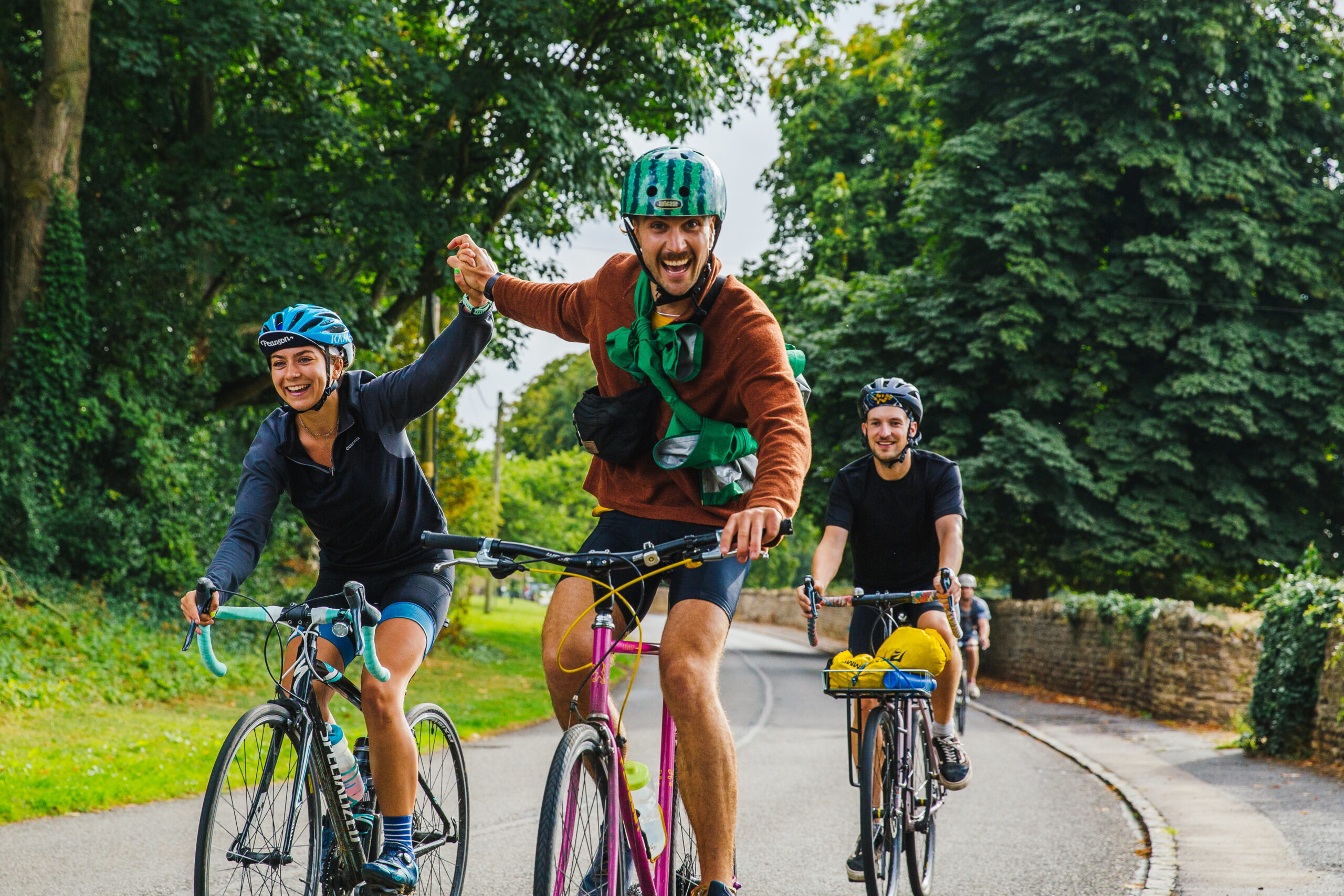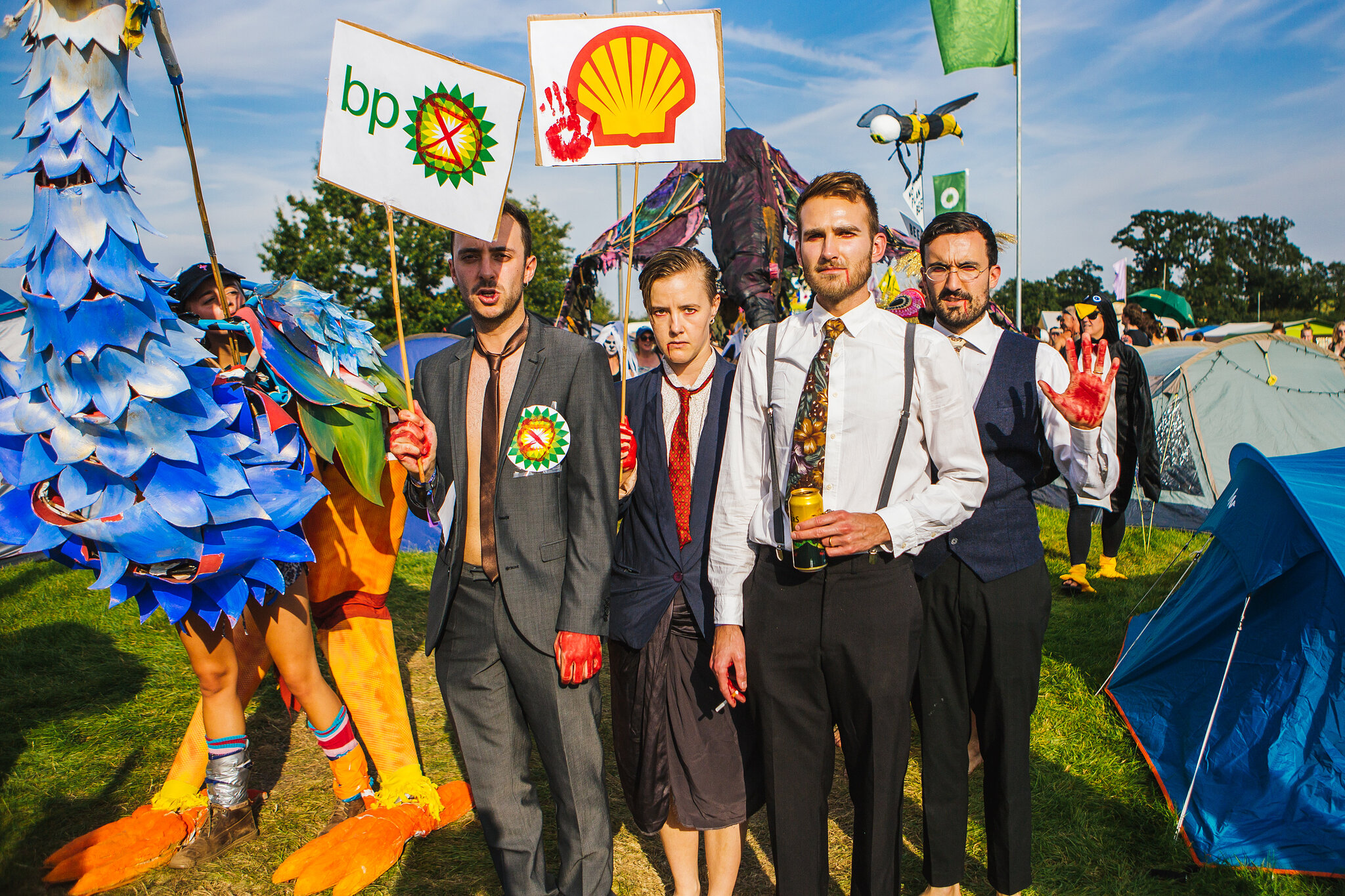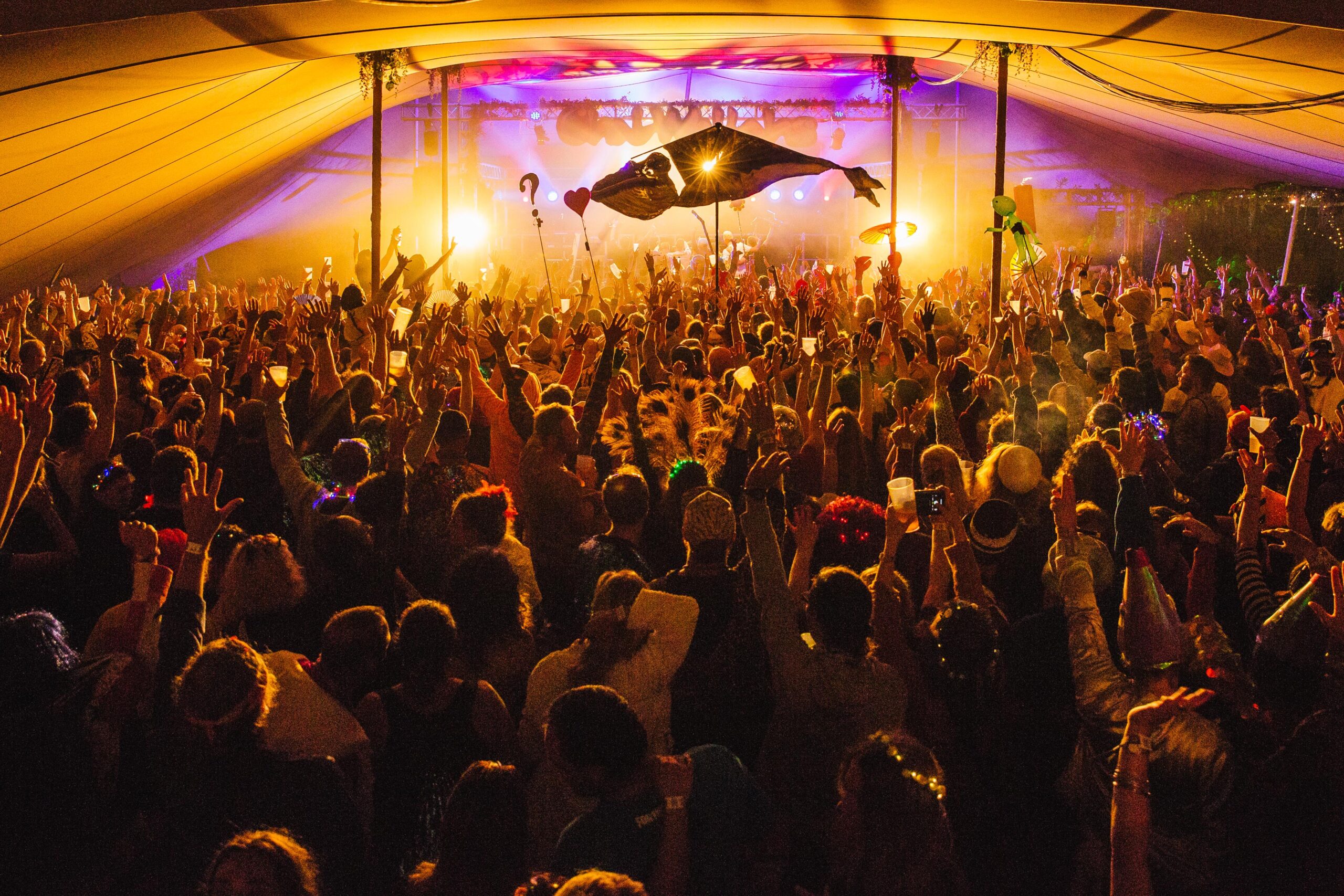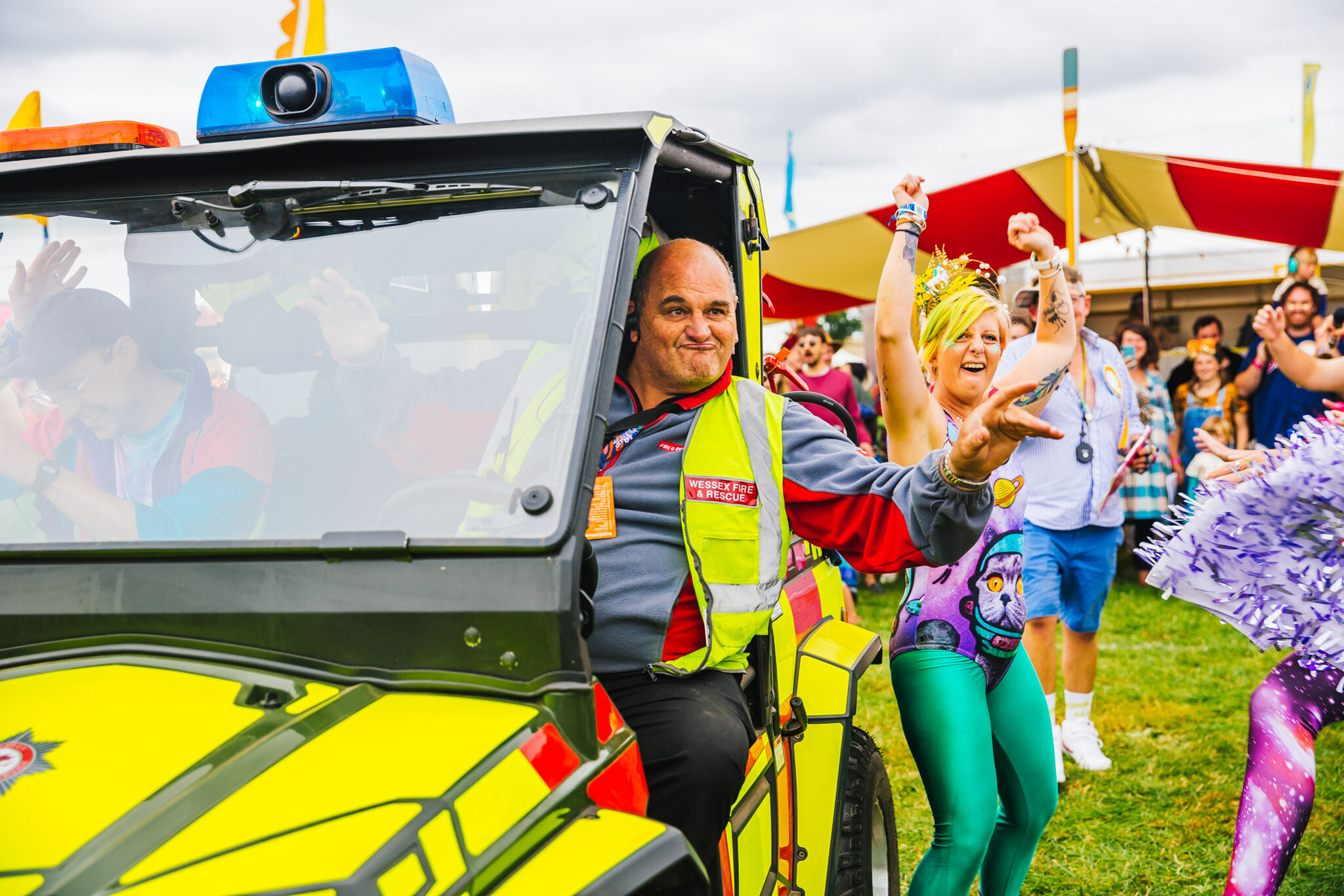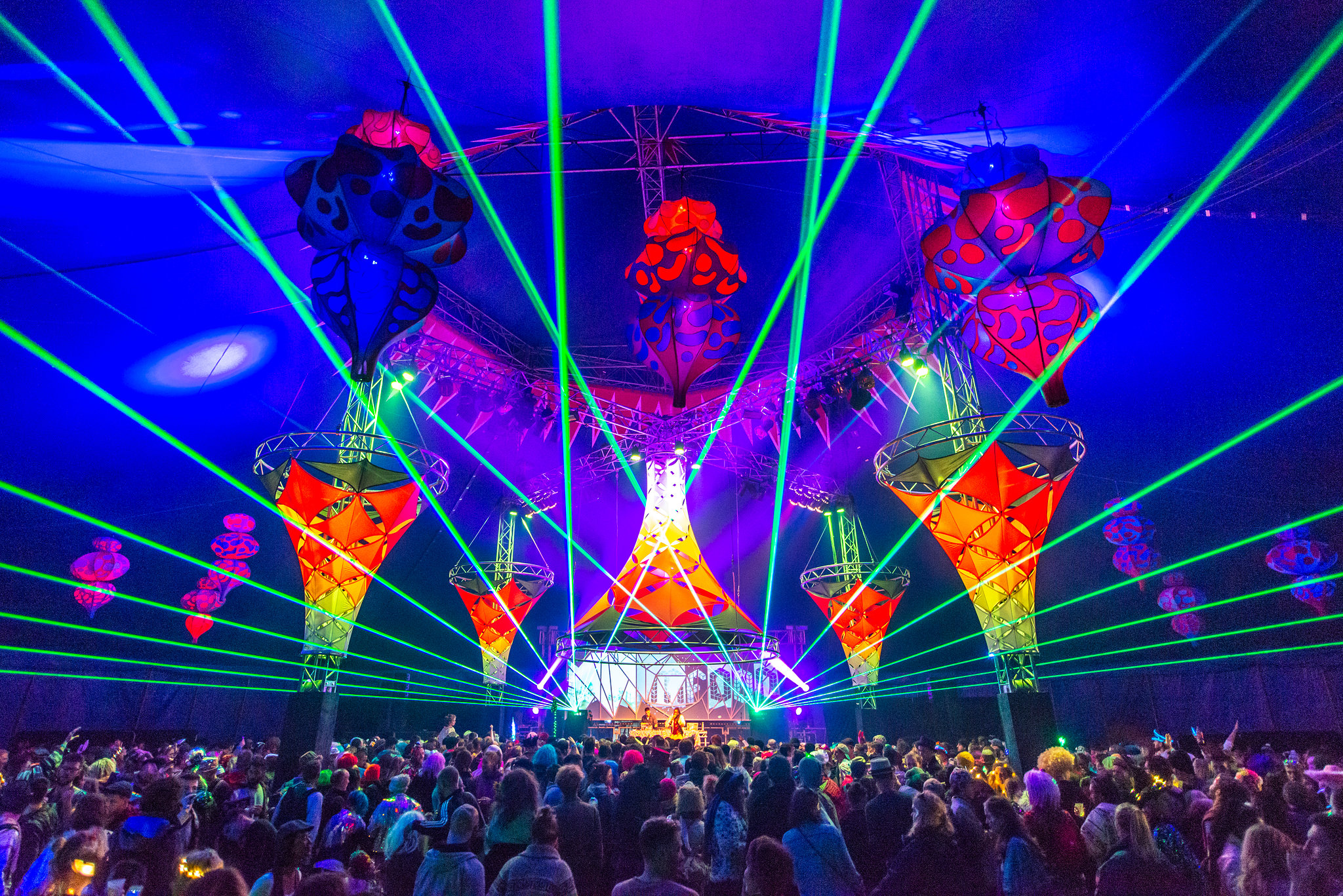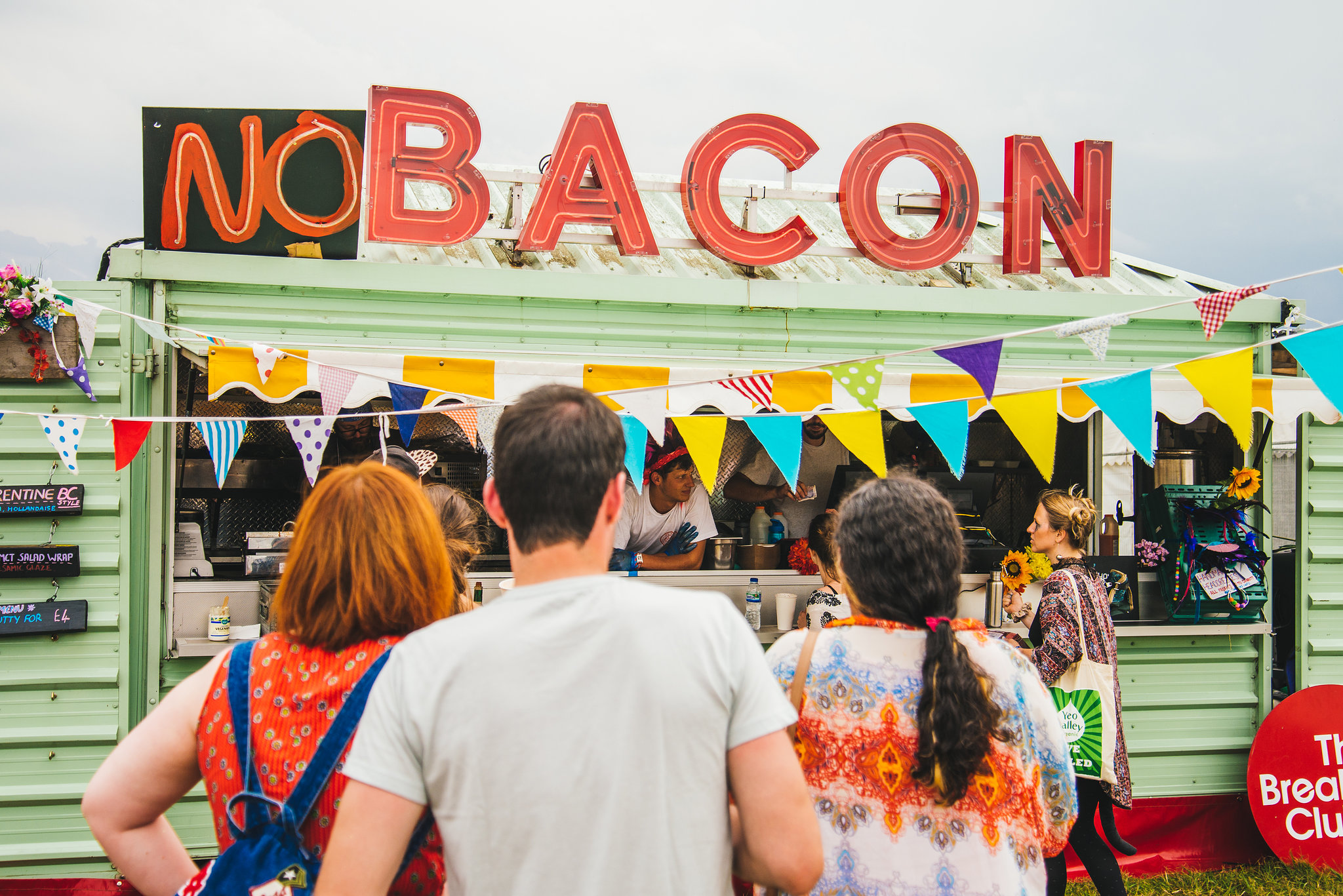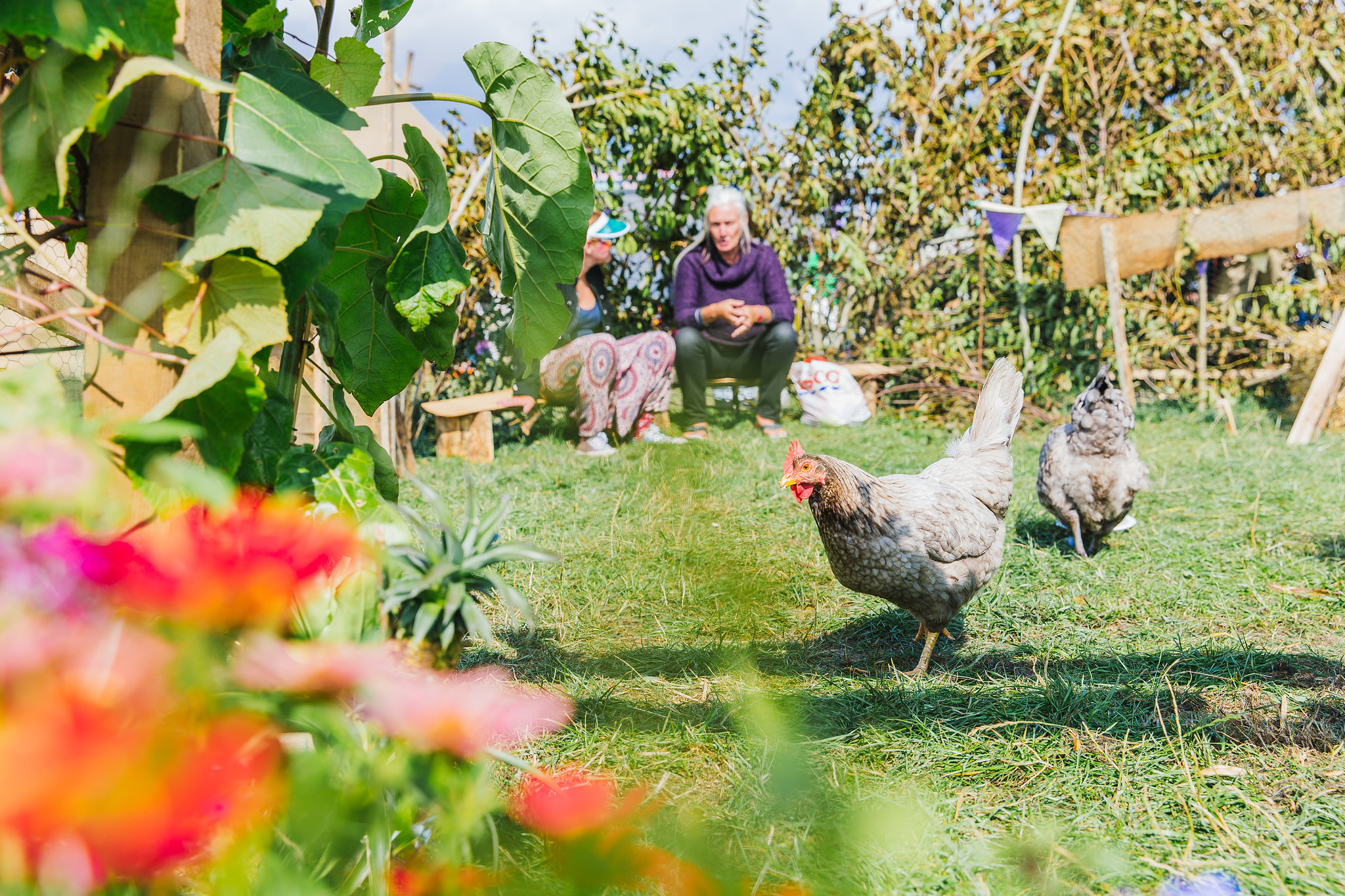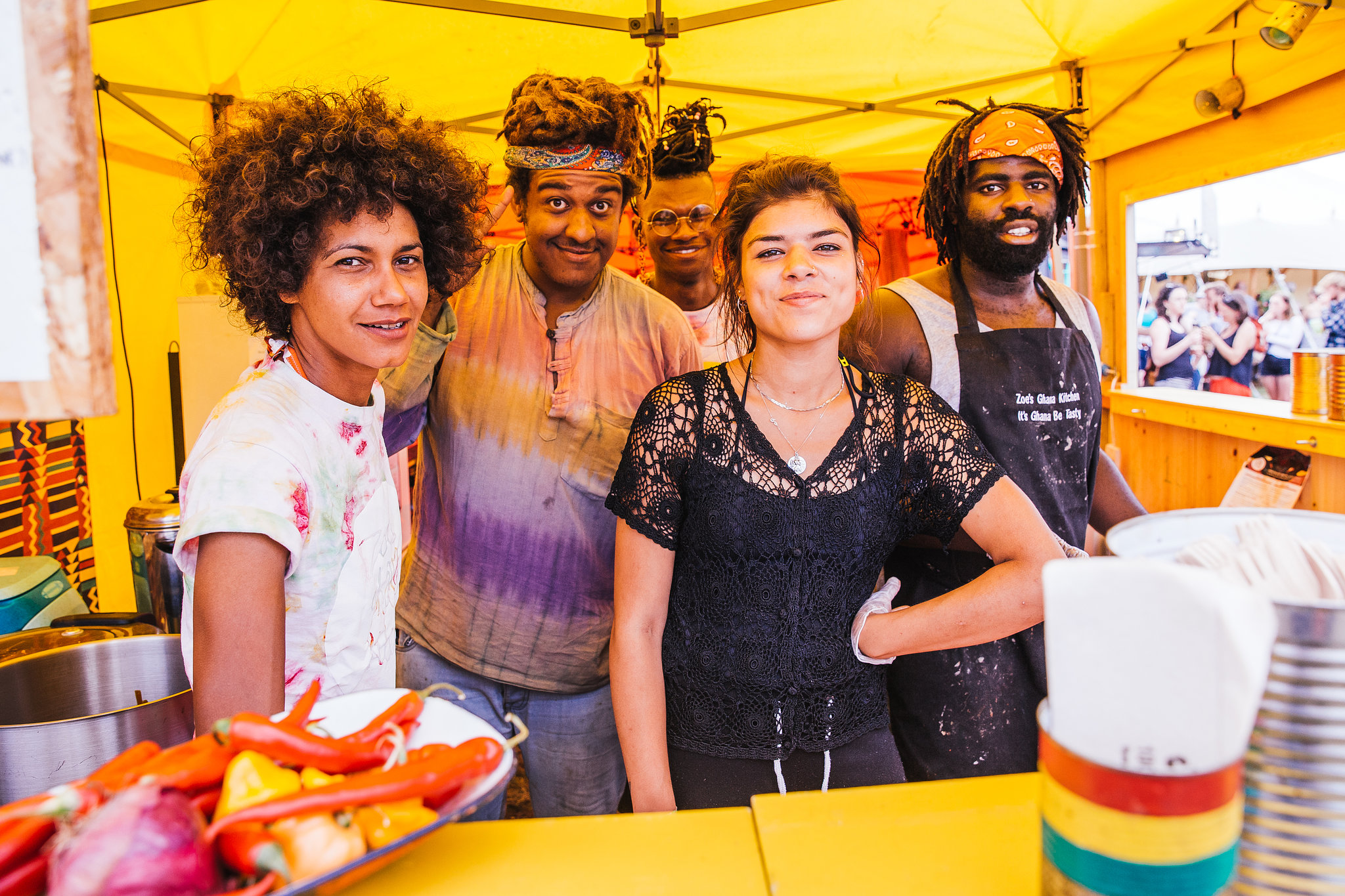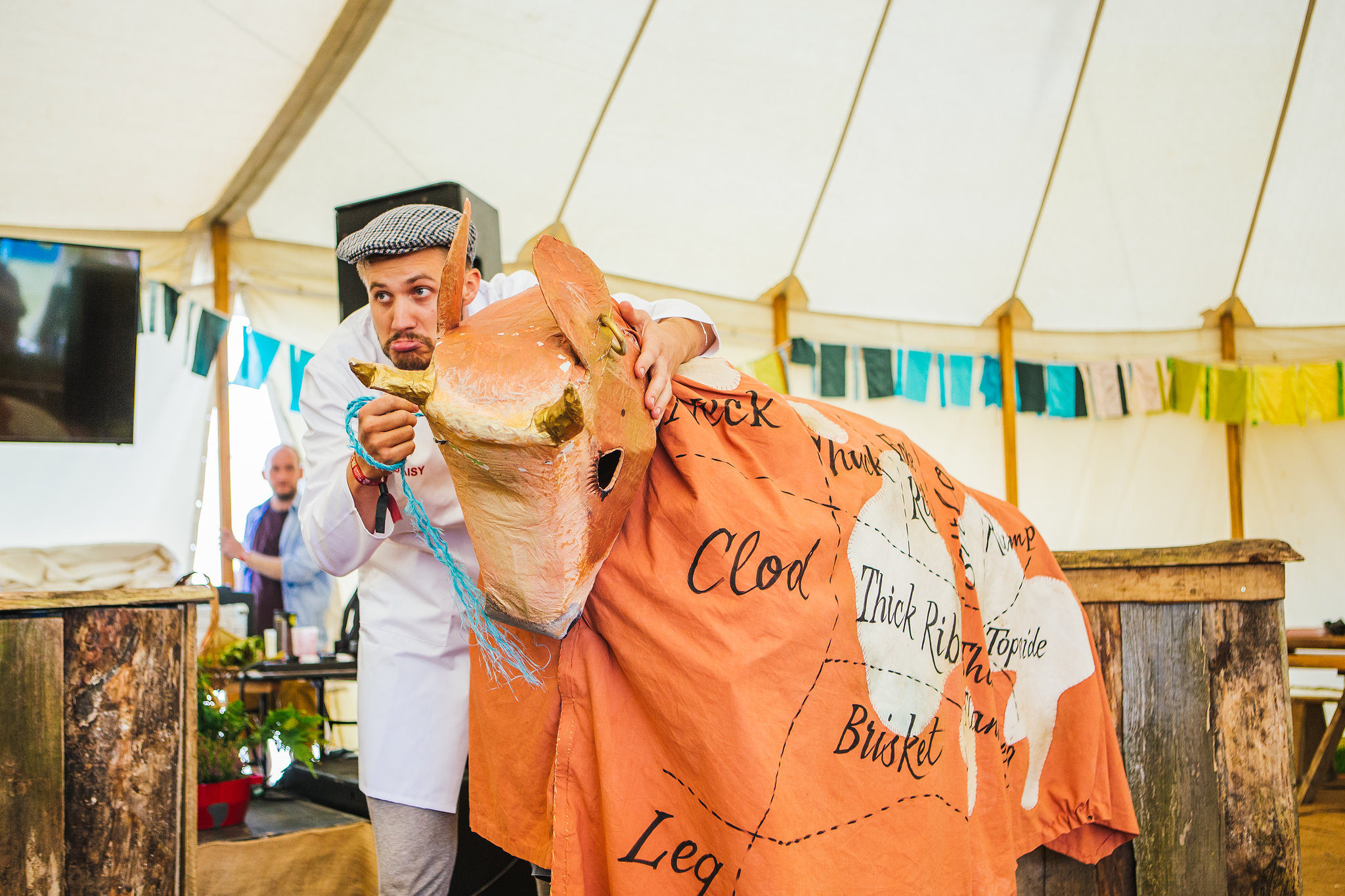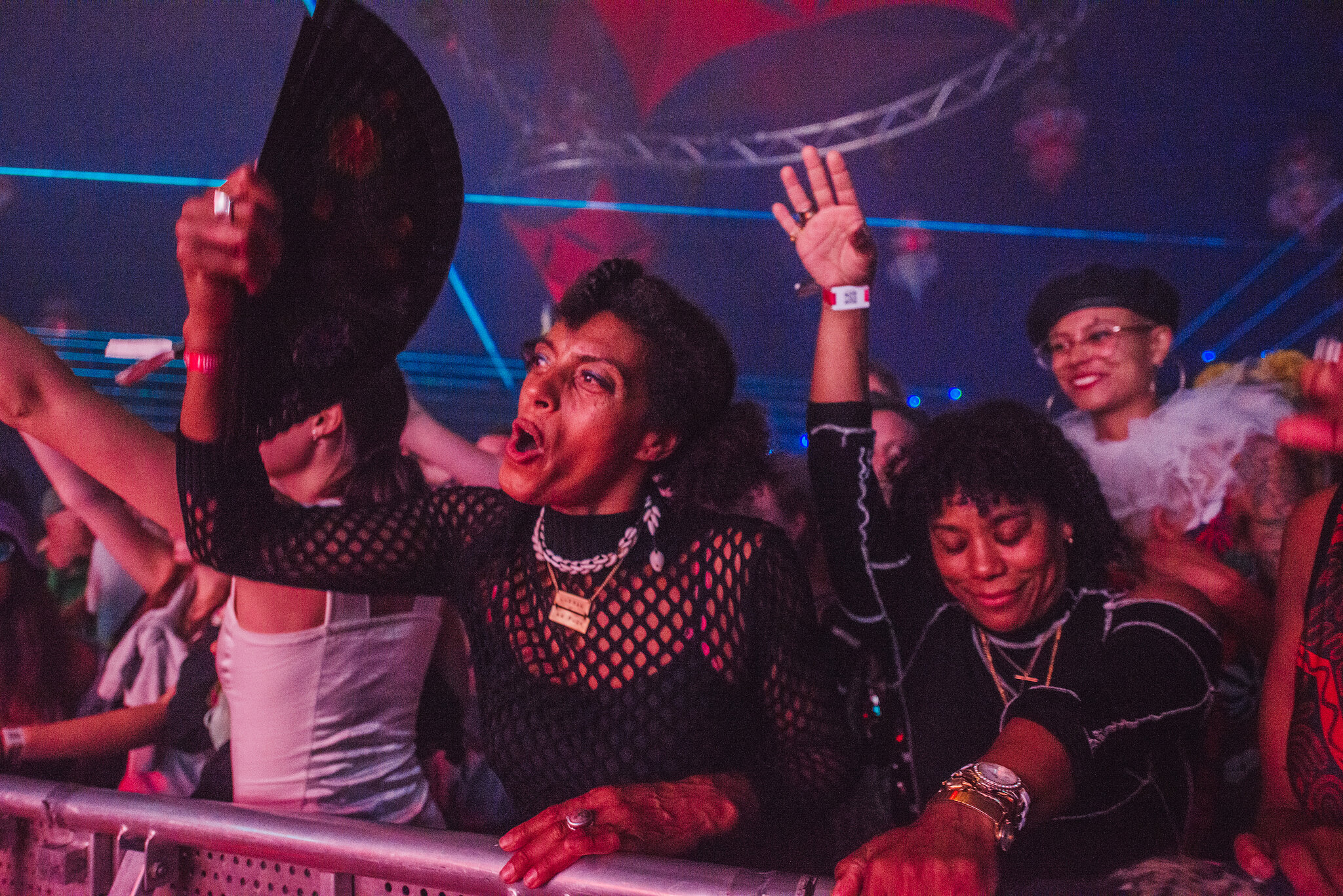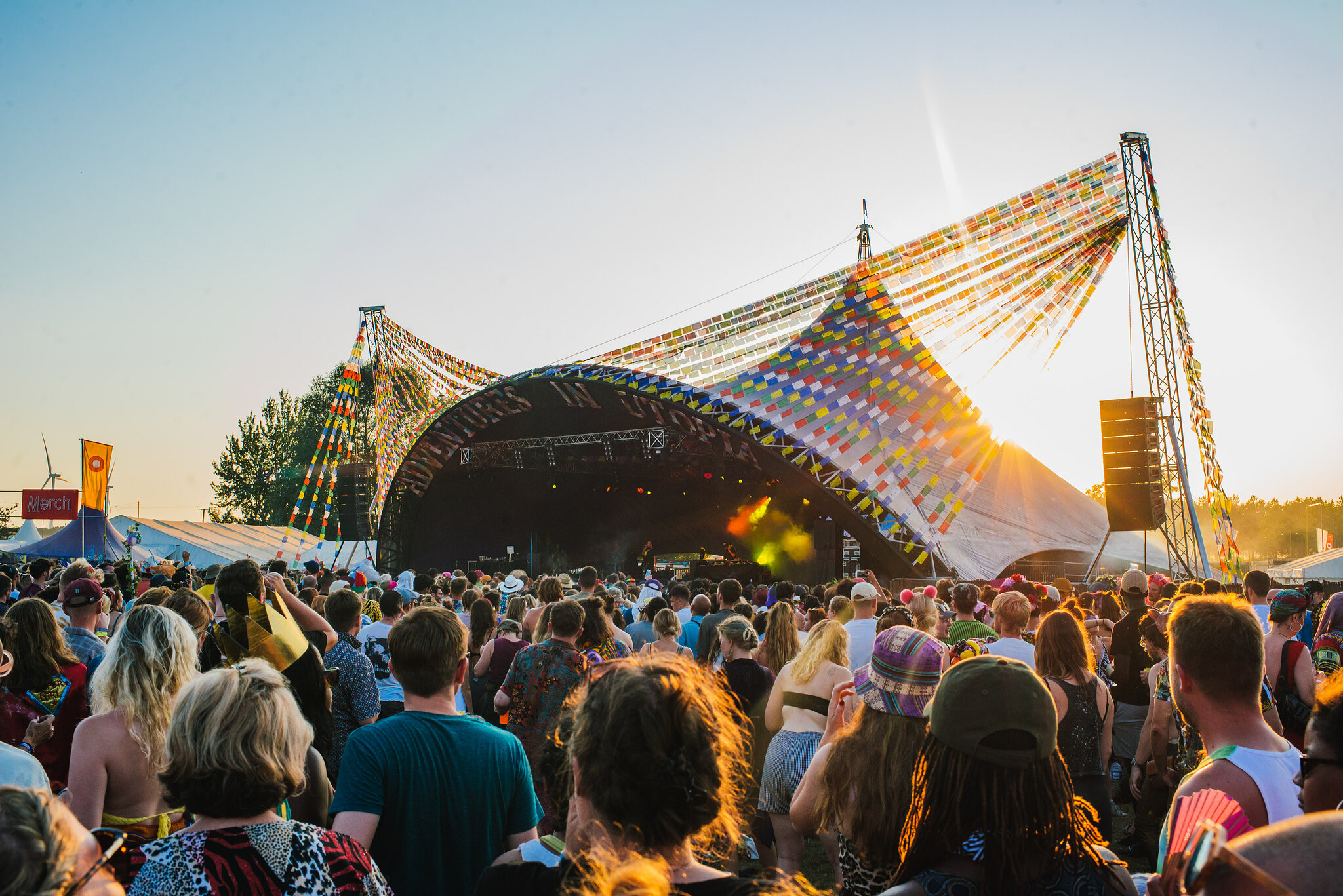This is your one stop shop to find out all about Shambala’s impacts on both people and planet. Here, you can find out where we’ve come from, what we’re doing (and why!), what went well this year, what didn’t work so well, and where we’re going next! We’ll update this after each festival to monitor our progress year on year.
We’ve got stats and figures coming out of our ears – and a whole host of videos to bring it all to life, and introduce you to some of the fantastic humans working hard behind the scenes to keep Shambala as pioneeringly sustainable as possible.
The point, of course, is transparency about our performance and impacts, and sharing the journey with everyone in our community – we’re in this together and it takes all of us to be pioneeringly sustainable; audience, artists, suppliers, crew, creative folks and everyone in between.
Dig in, watch, interact, and enjoy! x
Shambala 2022 in numbers
Carbon footprint
*Source – Creative Industry Green Tool carbon assessment (Julies Bicycle)
Energy
Waste
Food & Drink
Community Impact
Sustainable Stories: Cycling to Shambala
Watch the video
Travel
Highlights 2022 – What went well
(and what didnt!)
The Good News: Top 10
- Our team is Certified Carbon Literate!
- We eliminated single-use hot cups, avoiding 30,000 disposable cups
- We reduced fuel consumption by 7.7% (our fuel consumption is now 70% less than the industry average)
- 72% of recyclable materials were recycled
- Won the ‘OUTSTANDING’ A Greener Festival award
- Trialled wholesale of packaging free oat milk onsite (avoiding 5,000 Tetrapaks!)
- 10 tonnes food waste sent to be composted at local farm to grow food for next year
- All buggies onsite were electric… except one!
- We installed 120 energy monitors to get forensic on energy management
- More coaches than ever – 76 coaches with 3047 travellers
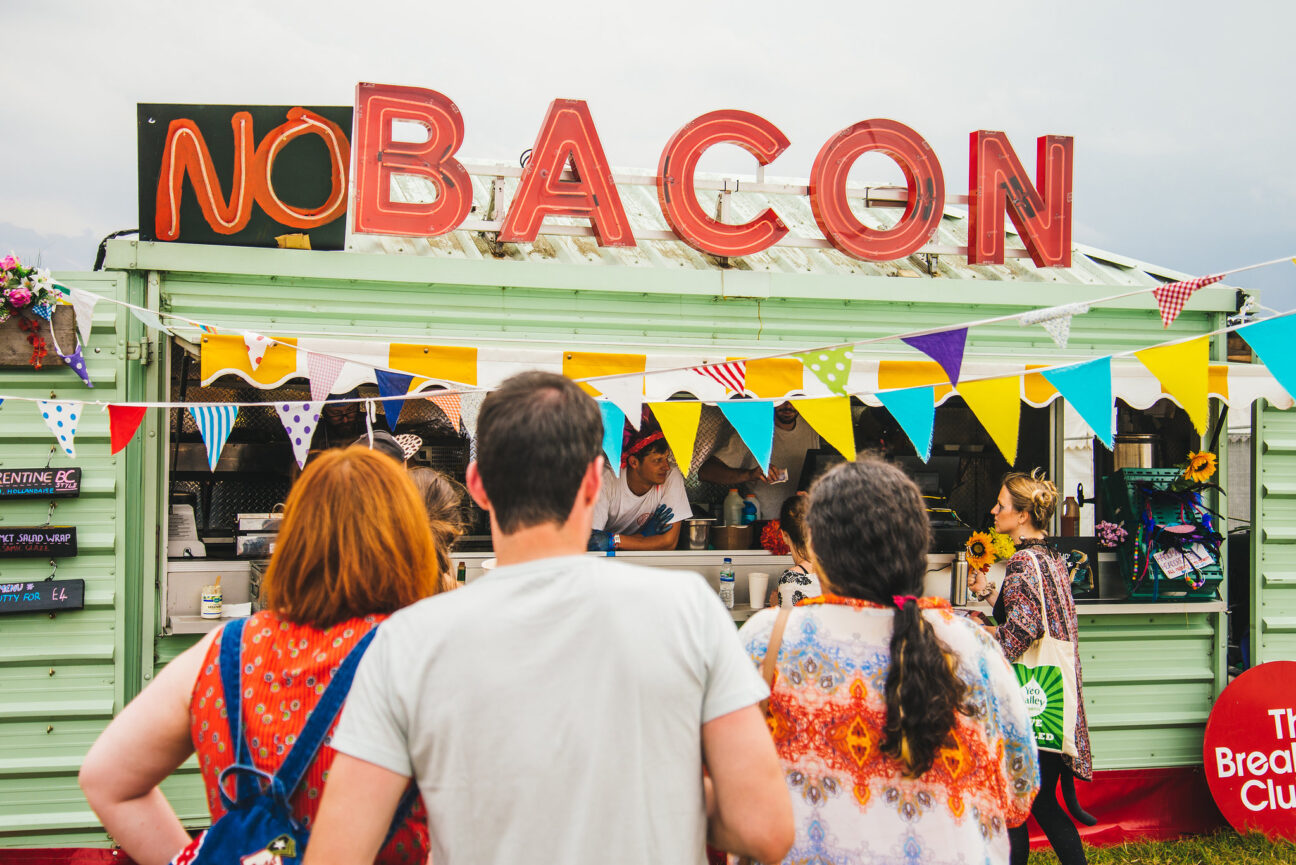
The Less Good News…
Our overall carbon footprint went up 25% (compared to 2019), almost entirely as a result of more cars and campervans coming to the event. We suspect this may have been at least partly down to the threat of rail strikes (we support the right to strike to protect rights and fair pay) and we hope to reduce this in 2023.
Our carbon food labelling didn’t work out: We set out to label the environmental impact of meals at food stalls, but without good signal onsite, people couldn’t access the information online via QR codes.
Bottled gas use used by food stalls went up this year, to be expected with 12% more people onsite perhaps. We’re looking into bio-gas options to eliminate this pesky fossil fuel remnant form our ecosystem.
The Shambala green story so far…
Since our very first gathering of 100 friends in a field, we have put a liveable future at the heart of the festival.
1999
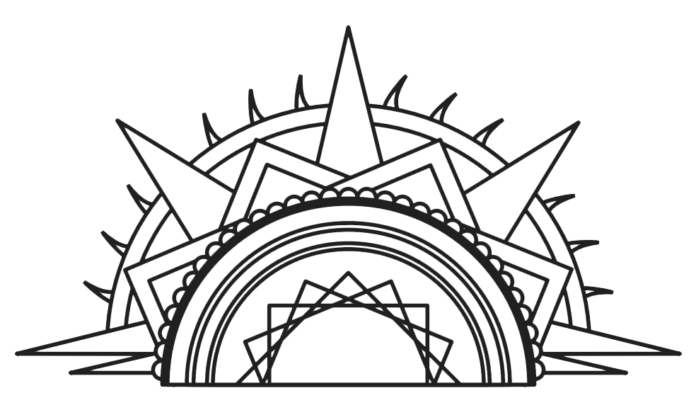
2001

2002

2004

2007

2008

2009

2010
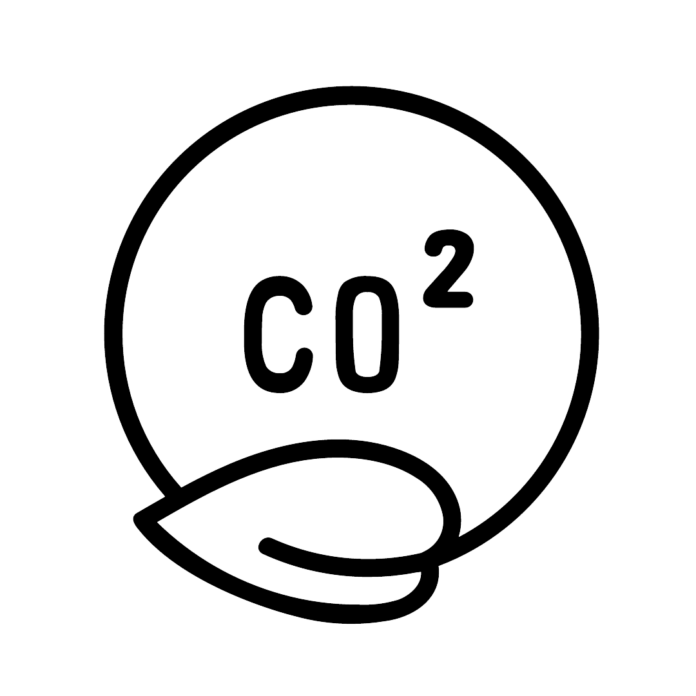
2012
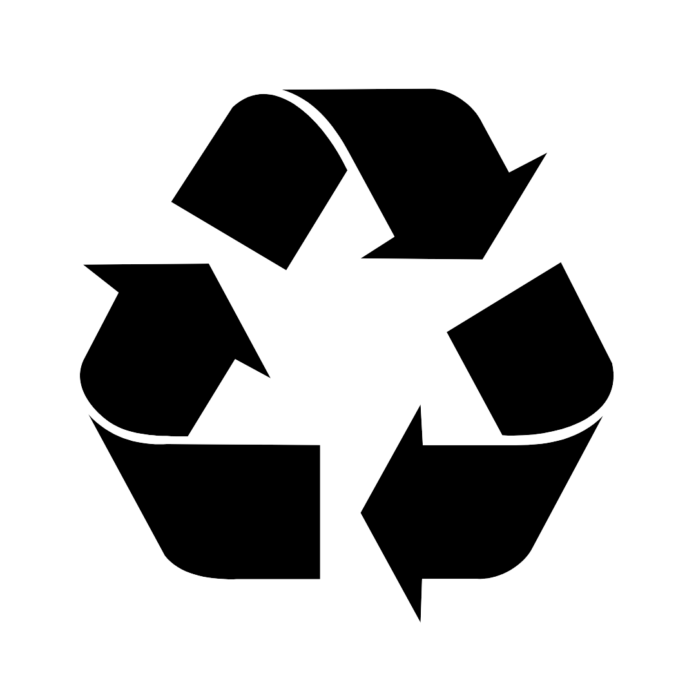
2013

2014

2014
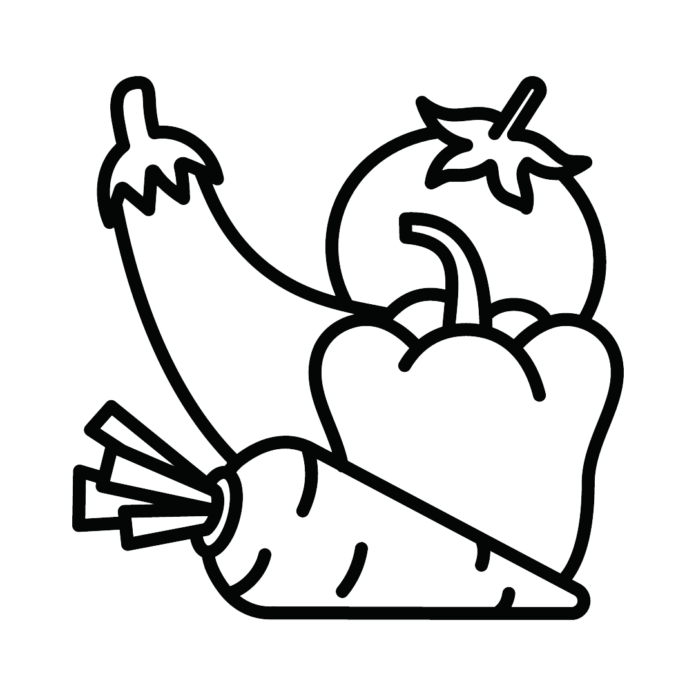
2015

2016

2017

2017

2018

2019

2020 (no festival!)

2021 (Shambino)

2022
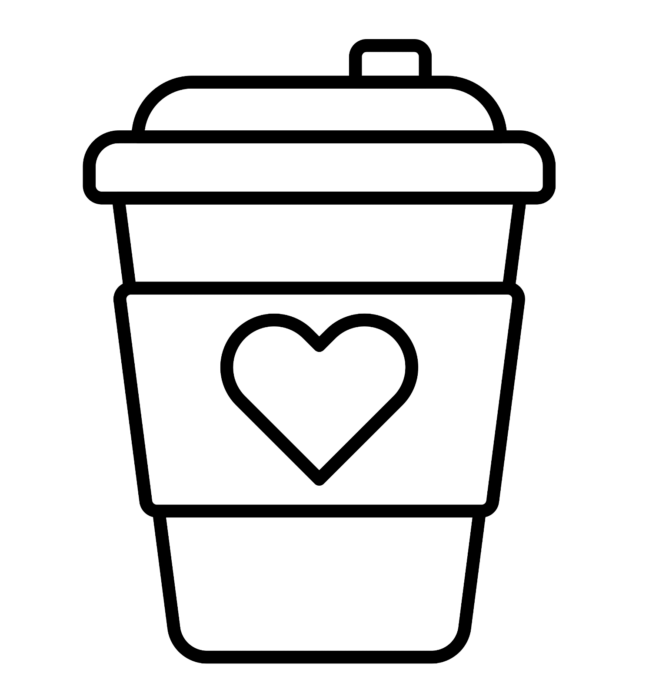
2023

2023

Sustainable Stories: True Independence
Watch the video
What we’re aiming for
Our company mission is:
To cultivate an ecology of radical events, platforms and projects that help regenerate the planet and build resilient communities.
Shambala is completely and utterly committed to being beyond sustainable; circular, regenerative, net positive, life- respecting, fair, courageous and future thinking – it’s why we exist. Our green practices are considered truly pioneering world-wide.
We have reduced the festival’s carbon footprint by over 90%, achieved 100% renewable electricity, become meat fish & dairy-milk free, and eradicated single use plastics. But there is always more to learn and do, in practical terms such as completely designing out waste, and in terms of influence – pushing the ‘art of the possible’ as a beacon of inspiration.
Focus Areas & Actions Taken:

Carbon footprint
- Reduce overall carbon footprint wherever possible
- Net positive through climate investments
- 100% renewable energy
- Focus on reducing travel & transport emissions
- ‘Food-print’ impact assessment and labelling

Circular economy approach to materials
- Reduce virgin materials and strict sustainable purchasing policy
- Eliminate single use across festival (including behind the scenes)
- Maximise recycling (no waste to landfill) • Food compost to local growers

Regenerative food sourcing
- Meat, fish and dairy milk free
- Local and seasonal • Strict high-welfare / sustainability minimum standards • Ethical and sustainable drinks
- Focus on working with small-scale regenerative farms
Positive influence
Positively influencing audiences, artists, crew, food traders, suppliers and everyone else in and beyond our community through the action we take as innovators, e.g. campaigns onsite such as meat and fish free, what we ask of suppliers/the journey we take them on toward better practices.
Boundaries of influence
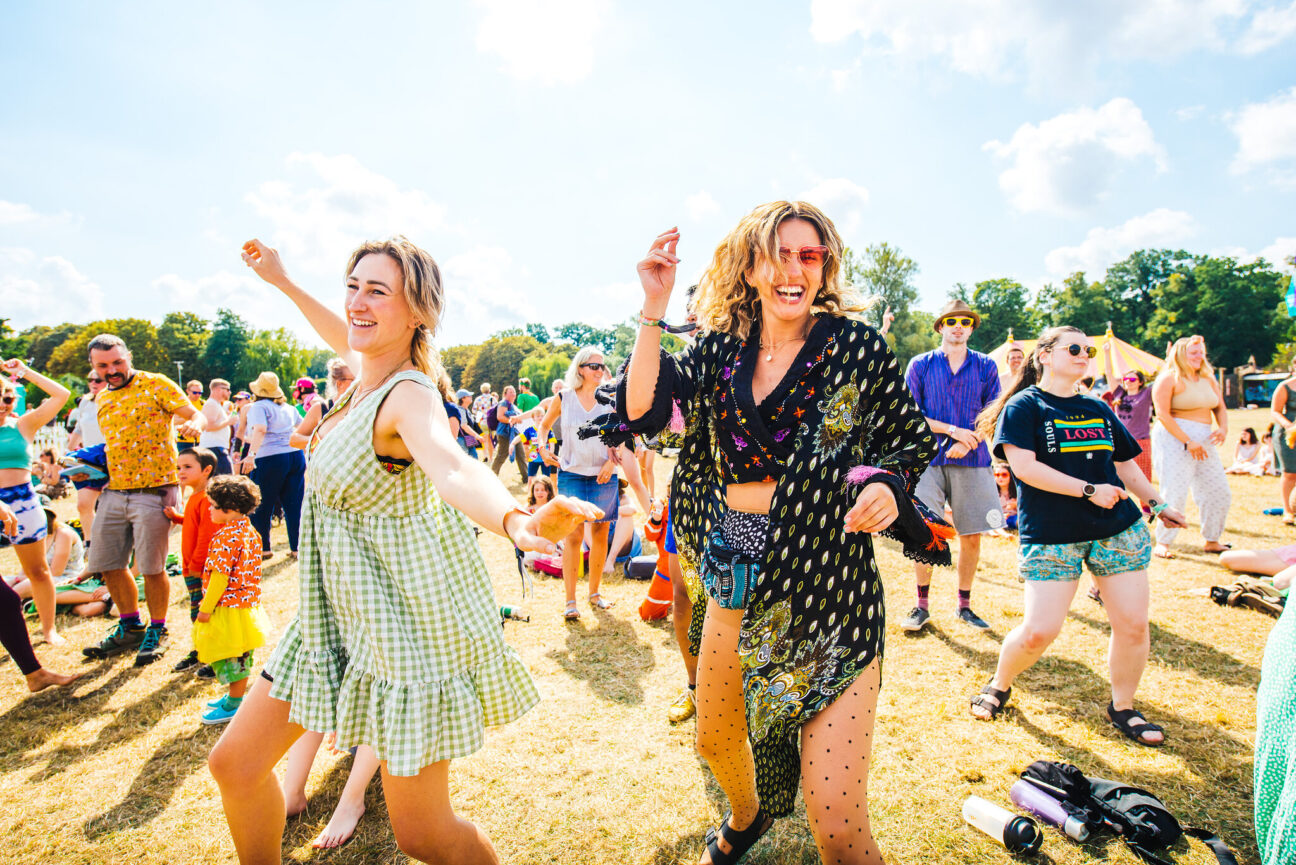
Being ‘Realistic and Ambitious’
A big question for us is defining our ‘boundary of influence’. We can (and do!) minimise the negative impacts of delivering the festival – this is clearly our direct responsibility and within our control.
The influence we can have beyond what we can control, and beyond the few days of the festival itself, through the actions we take at the festival (such as going meat and fish free and disposables-free to spark important conversations) have proven that we can inspire people to adopt new ideas and behaviours once the festival is over.
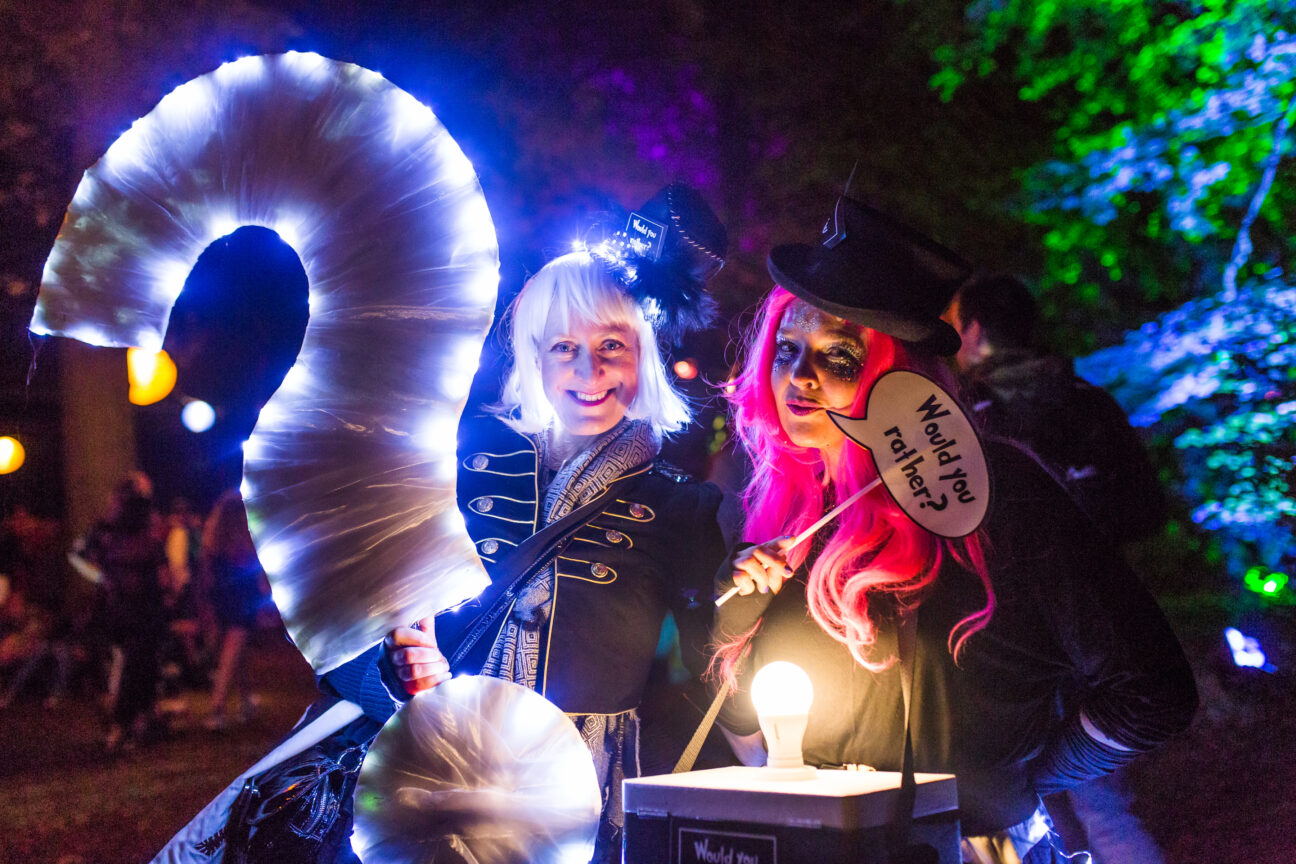
But the question is…
How far do we go and where do we focus our effort, as a festival, and as an organisation with limited resources? Where do we place our ‘realistic and ambitious’ boundary, so that we are effective, and play a role as innovators and activists?
For example, we’re passionate about carbon labelling, the idea that we can be well-informed about the environmental impact of everything we buy, but perhaps this is best left with supply chain industries and retail at large. Or in some cases, like food impact labelling, can we usefully innovate in a way that would prove something is possible, and share it in a way that inspires wider adoption, in the festival sector and beyond? These are ongoing considerations for us.
OUR CURRENT BOUNDARIES OF INFLUENCE
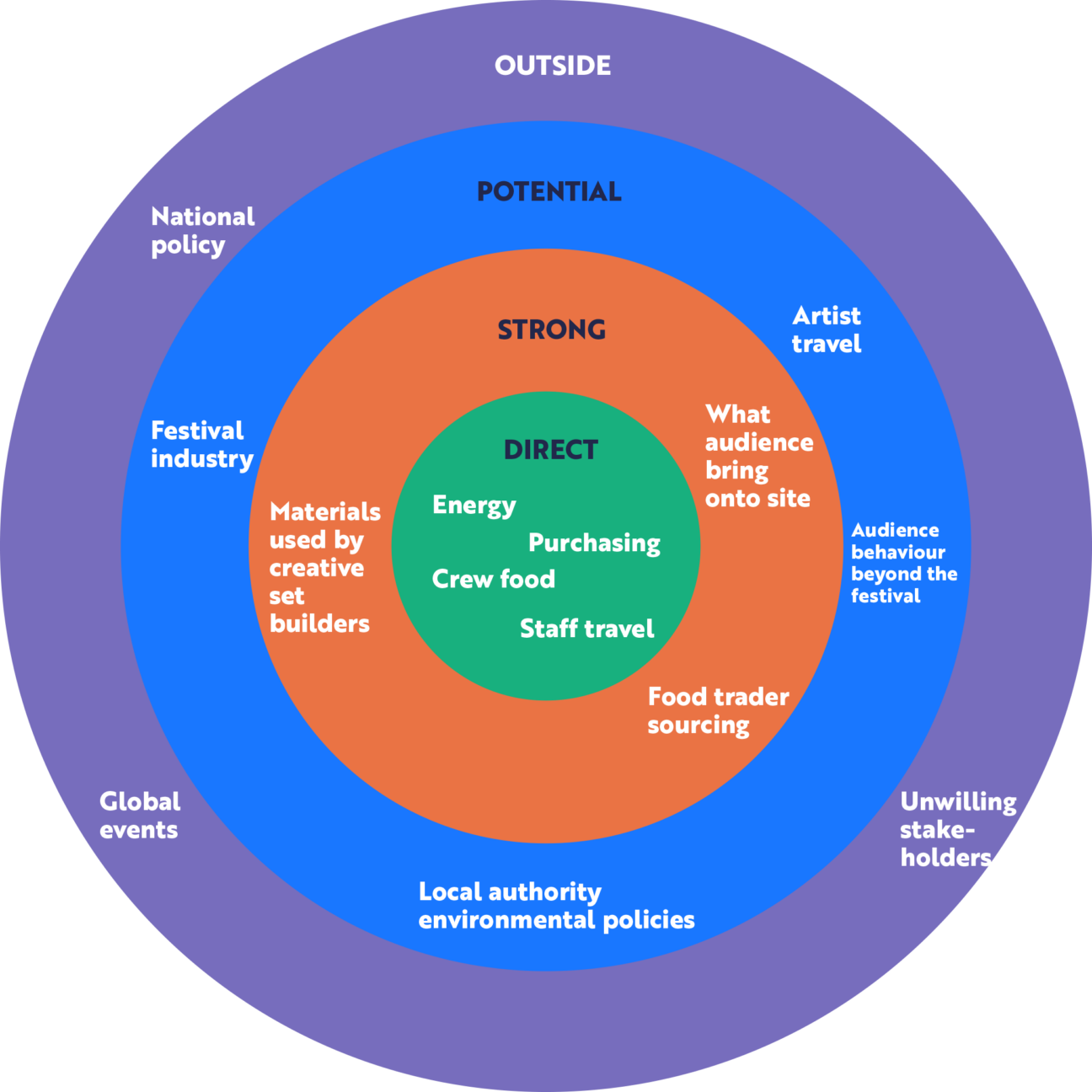
Note: This is not a complete list –
we are currently mapping in detail boundaries of influence and stake- holders as part of work toward a five year vision and action plan.
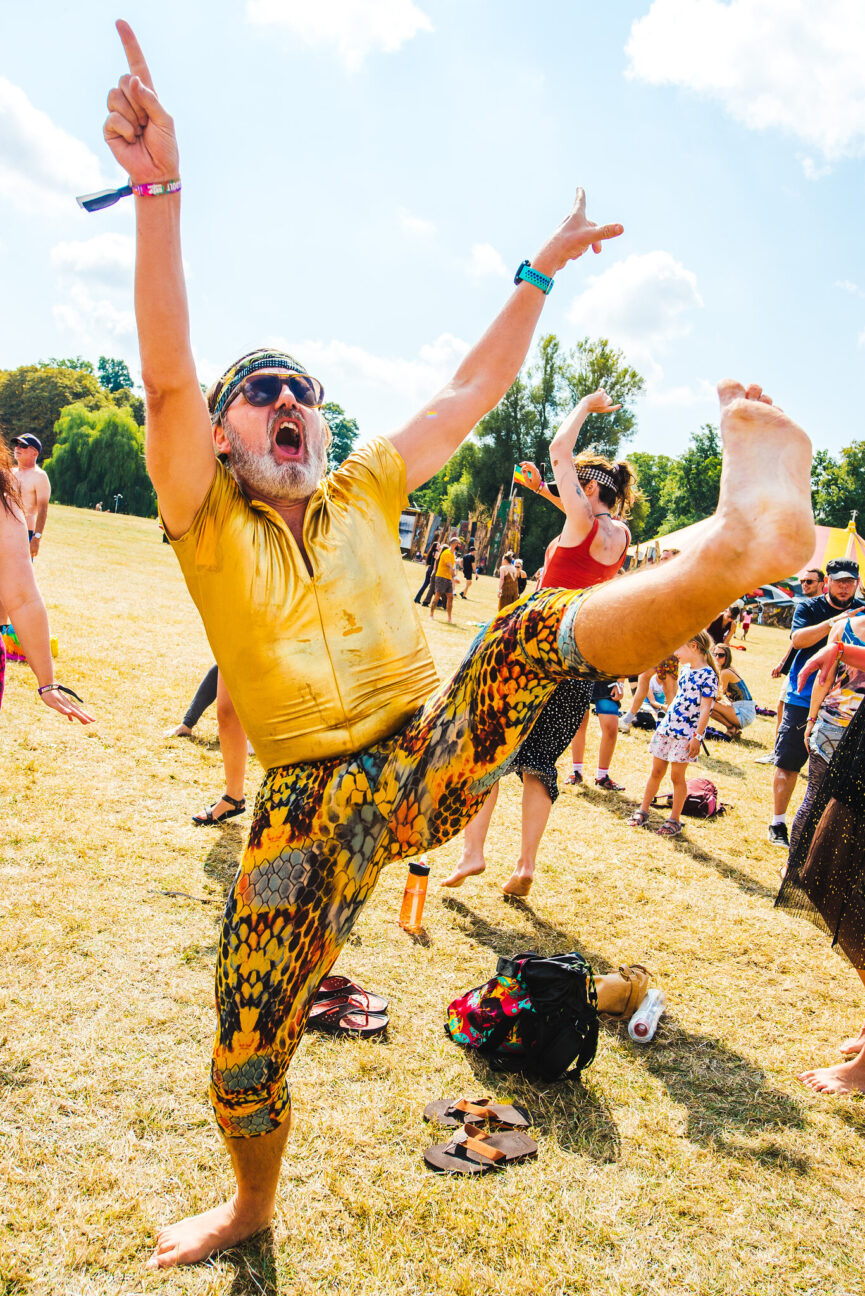
We are working on all our ‘areas of influence’, including beyond the festival, for example…
Back in 2016, our audience voted to use the ‘carbon offset donations’ made when they purchased a vehicle pass, to create an independent charity, Ecolibrium, to tackle the festival industry’s travel emissions.
Research shows that typically 80%+ of a summer greenfield event’s carbon footprint is from travel. For Shambala it’s 92%!
Ecolibrium now works with over 100 festivals to provide resources and tools to reduce travel emissions, and has invested £400k in climate projects, balancing over 25 million miles of travel.
All Shambala’s audience carbon offset funds are invested with ecolibrium, and this year we supported an amazing project – Energy Garden.
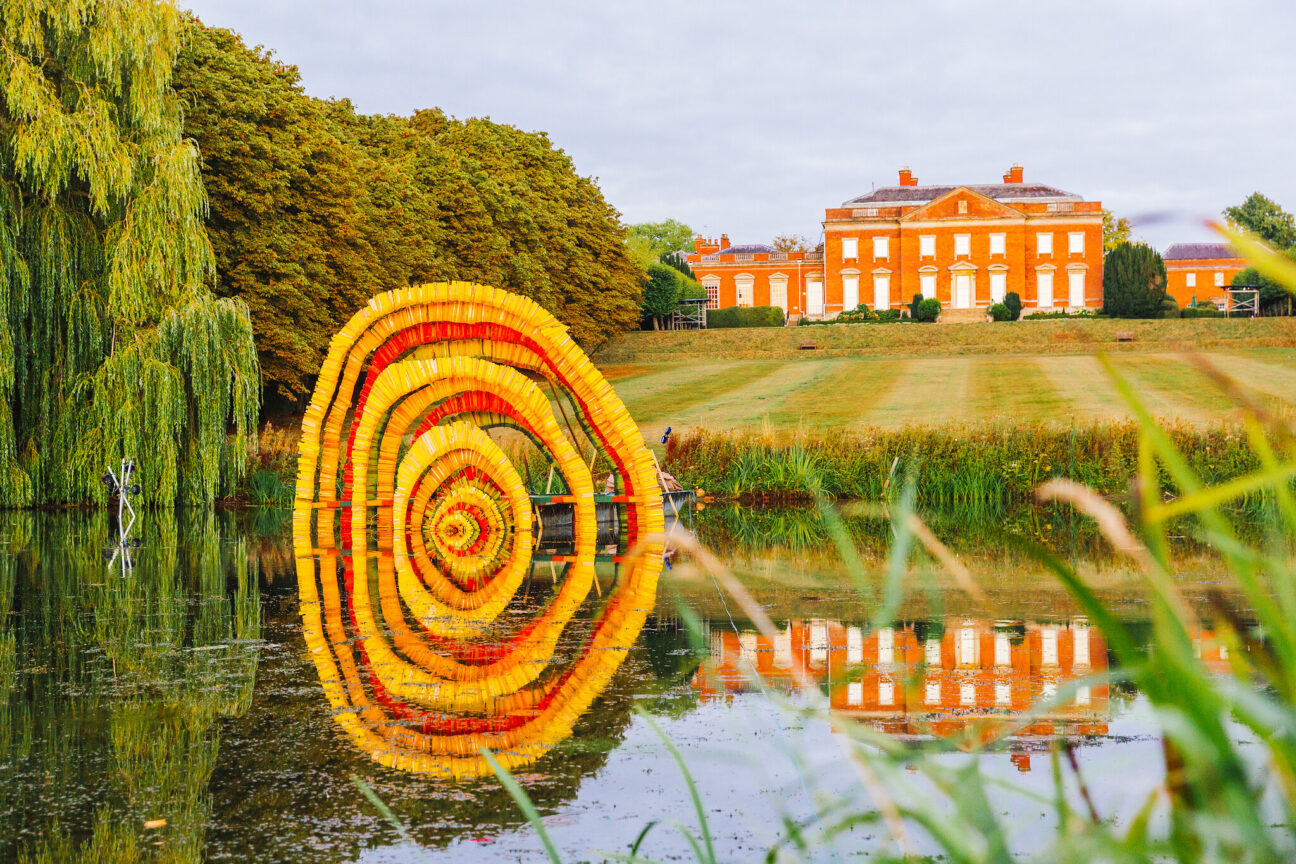
Outside of our influence (or is it?)
We [begrudgingly] accept that some things are completely outside of our influence – such as the will of our political leaders to implement meaningful environmental policy, and global events. What we can do is nibble at the edges by presenting inspiring and radical content at the festival that helps to keep us informed and respond to what’s happening in the world, take part in wider initiatives in the festival industry, and support organisations that are doing important work.
Community impact, partnerships and research
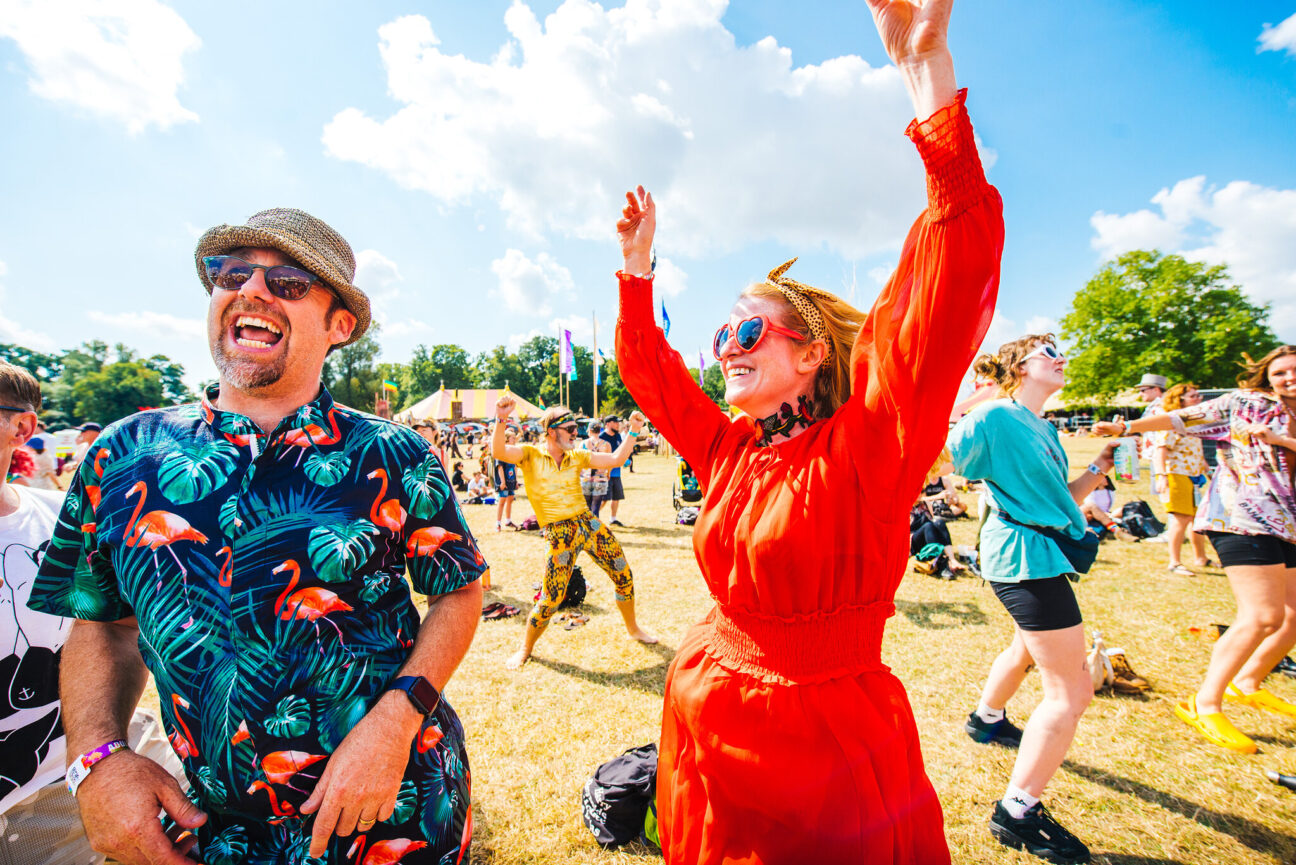
As we close the door on 2022, we’ve taken a look back at all the different initiatives that ran before, during and after Shambala this year and totted up the totals. Thanks to you lot we’ve managed to collectively raise a whopping £133,807.45 for a whole host of amazing partners!
This total has smashed our previous record of £105,000 in 2019, and we couldn’t have done it without the kindness and generosity of every person who donated their time, skills or pennies this year, or our partners out there on the frontline delivering vital work.
The money raised this year went to some incredible causes to implement real change…
Pay It Forward: Share The Love. This year we introduced a Pay It Forward initiative to raise a pot of funds that will enable us to create full festival access options (not just tickets, but travel, camping equipment and food) for folks on low incomes to come and join the party, in 2023 and beyond. You lot got thoroughly stuck in, donating at our bars when getting your drinks in, and making further donations buying your 2023 tickets. Thank you to everyone who’s enabled us to kickstart this project with a bang!
Each year, as part of our annual ‘Flags For..’ campaign, we ask our audience to sponsor the strings of prayer flags flying from the Shambala Stage, for a different cause or campaign. In 2022, we chose Peace Direct, who work with local people across the globe to stop war and build lasting peace in some of the world’s most fragile countries.
Our incredible Oxfam stewards donated their time to raise money to fight poverty and provide disaster relief in worldwide projects.
Our MyCause volunteers donated their time to raise funds for their chosen charities, including: Autism Alliance UK, Bristol Refugee Rights, Coppafeel, Devon Rape Crisis and Sexual Abuse Services, Sea Shepherd UK, Stonewall and War Child.
Rebel Soul‘s on site cafe raised money for various grass roots initiatives and activism campaigns.
This year we hosted the hilarious ‘The Worst Record Covers Exhibition’ which raised donations for Different Strokes, a charity supporting younger stroke survivors.
NOSH Community Cafe served up hearty meals on site, with all proceed going directly towards supporting social and charitable causes in the local area, such as youth groups and community spaces.
Temwa raised money through providing phone charging services on site, which will go towards various Malawian projects that support people and environment.
You lot balanced 100% of your car and van travel emissions with Ecolibrium, helping to to plant trees, protect the rainforest and create renewable energy projects!
Our stainless steel water bottles are supplied by RAW Foundation, and FRANK Water kept them full for you over the weekend at their refill stations! FRANK Water will be using these donations to provide safe drinking water in India and Nepal. RAW Foundation will use funds raised to continue campaigning against pointless plastic.
Our merch team raised much needed funds for Bansang Hospital through the sale of our Special 20th Anniversary Edition Programmes.
All profits raised by the sale of Love Specs at Shambala helped Love Support Unite empower communities in Africa through sustainable development, education and healthcare.
The Flying Seagull Project provided entertainment in the kid’s area, raising funds to spread happiness with young people in refugee camps across Europe and the Middle East.
WaterAid provided some lush toilets for us this year and raised money to provide people across the world with clean water, decent loos and good hygiene.
Research Partnerships
We can’t single- handedly change the festival sector or the world. We take opportunities to collaborate and support research wherever we can. Festivals are a fantastic opportunity to experiment with change. This year we worked with a few great projects…
Travel behaviour research:
We worked with the Centre for Social Transformation (CAST) on a project to understand influencing travel behaviours – you may have filled out a survey onsite with their researchers.
Festivals sharing experiences:
Shambala is an active member of the Green Deal Circular Festivals project. Funded and facilitated by the Dutch Government, it is a collaboration between leading green events across Europe to share knowledge and build a model for a circular festival.
Future Festival Tools:
Shambala is featured as a case study and in an e-Learning course as part of a new free-to-access European sustainability resource for event organisers.
Environmental reporting
Our Carbon Footprint:
We measure and report carbon emissions according to the international Green House Gas Protocol.
Shambala’s Footprint by Scope in 2022
Shambala Carbon Emissions Breakdown 2022*
Notes:
Of 25 tonnes of onsite emissions, 23 tonnes came from bottled gas for cooking food, with the remaining 2 tonnes produced as a result of waste-related emissions.
We are working to have accurate figures for non-audience travel and transport in 2023, i.e. suppliers and artists travel. This data is not included in the carbon assessment tools
we use, but we will cover this in the travel section below.
*Source: Creative Green Tool carbon assessment (Julies Bicycle)
Sustainable Stories: Fire to the (Planet’s) Rescue
Watch the video
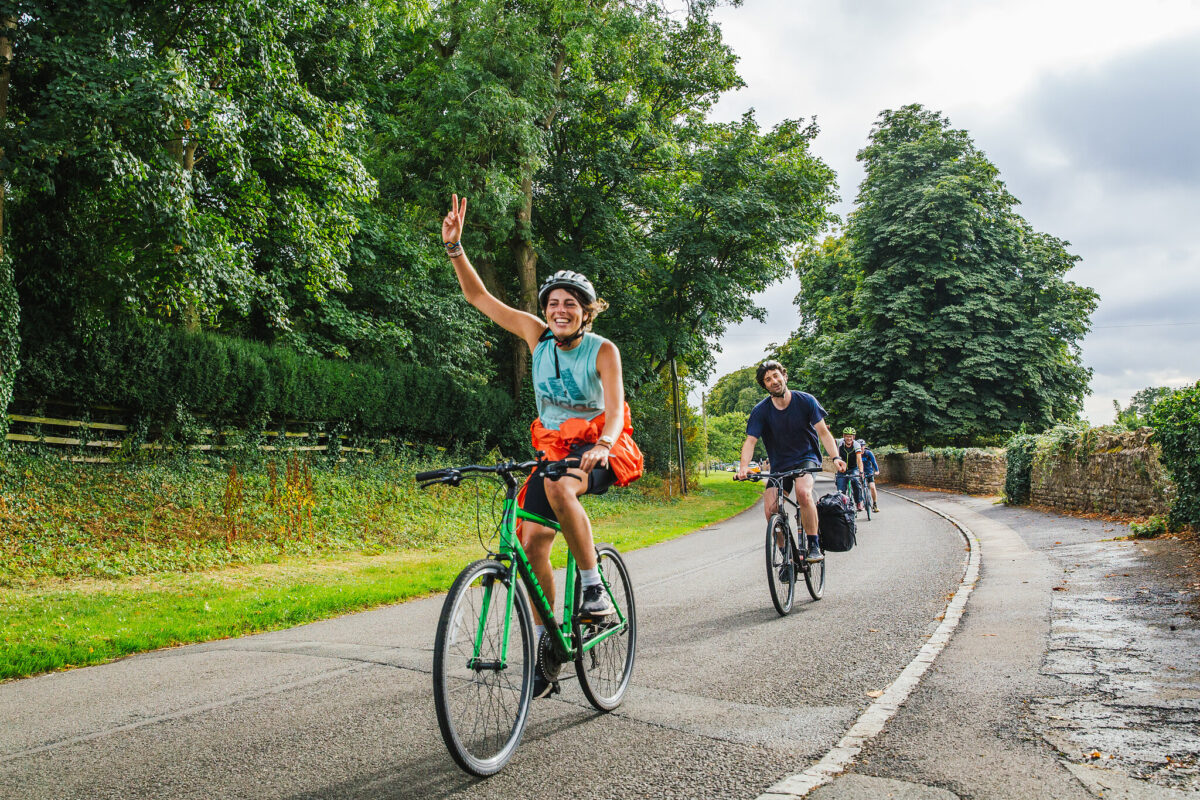
Carbon Balancing
We have been carbon net positive for 10 years, but this hasn’t taken the shine off our determination to reduce our footprint. Our stance is ‘reduce first’, and responsibly invest in climate, nature, and people at the frontline of experiencing the impacts of the climate crisis.
A £1 carbon balancing levy is added to every car pass at point of sale (£3 for campervan passes). In 2022 audience balanced 307 tonnes carbon with an investment of £7,677.56 through the Trees+ program. This covers all audience travel emissions.
Our scope 1 emissions (aka our direct ‘onsite emissions’) are offset by a long- term investment in a wind turbine project in India, which mitigates 164 tonnes per year compared to a footprint of 25tonnes CO2e emissions (2022). This makes Shambala roughly 6x carbon positive. The electricity is sold to local community and a hospital.
To become ‘scope 3 net-neutral’ we need to see contractor and artists travel and transport emissions balanced too. This responsibility
lies with the contractors and artists themselves, and so our role is to encourage (or mandate) balancing as a condition of contract/agreement.
Watch this space!
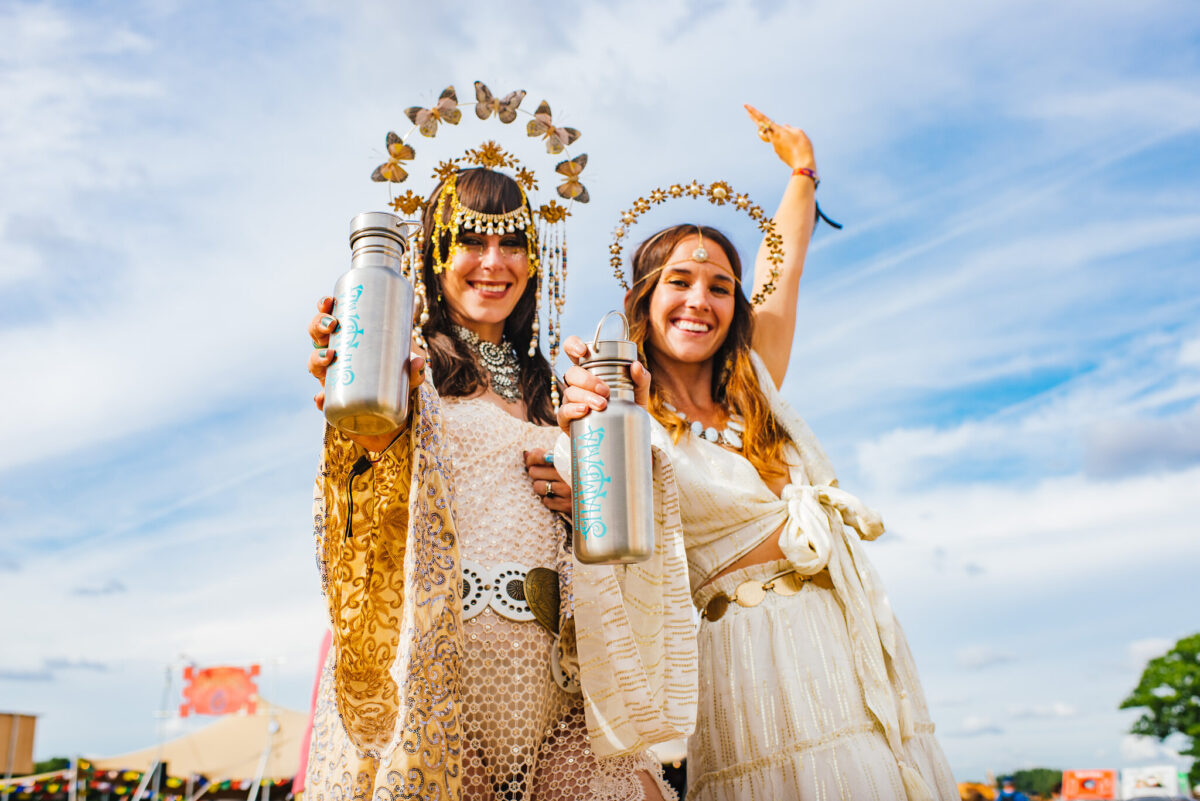
Beyond Disposables
Reducing waste and eliminating single use has been a focus for initiatives at Shambala for many years, and we’ve almost cracked it.
There are no disposable plastics provided at Shambala: We use reusable bar cups, don’t sell drinks in single use plastic, or use single use sauce sachets etc. We do the same behind the scenes, with reusable plates and cutlery in crew catering, wholesale oat milk in glass bottles, and volume soft drinks on bars. The tricky one for us is plates and cutlery – we use compostable plates and wooden forks/knives, which is pretty good, but ideally, we’d love to be completely disposables free. If we find a viable option, we’ll do it.
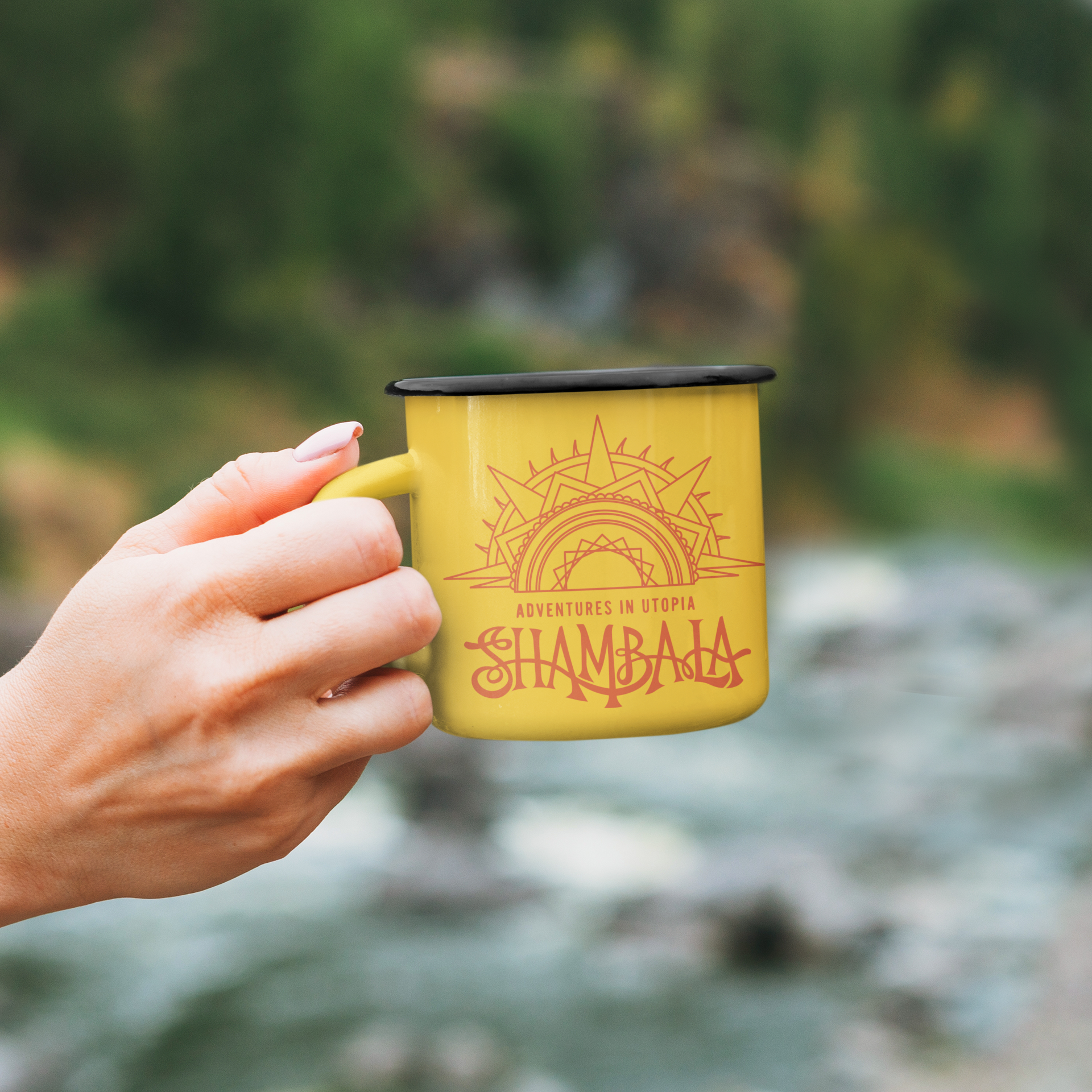
Sustainable Stories: Eliminating Disposable Serveware
Watch the video
Overall, waste was a big success story this year!
- We reduced real overall waste (tonnes) by 5% compared to 2019 despite increasing audience capacity by around 12%
- We reduced waste per person by almost 10%
- We achieved zero waste to landfill
- We increased our recycling rate to 72% of recyclable materials (52% of all materials).
- 10 tonnes of compost were taken to a local regenerative farm, and will be used to grow food for Shambala 2023!
- We published a Sustainable Production Guide – a great new resource to support our creative community to be circular.
- We used 174,175 reusable cups
- We introduced dedicated vape collection points
- 98.5% of festivalgoers said they brought a water bottle in ‘The Big Debate’ feedback survey
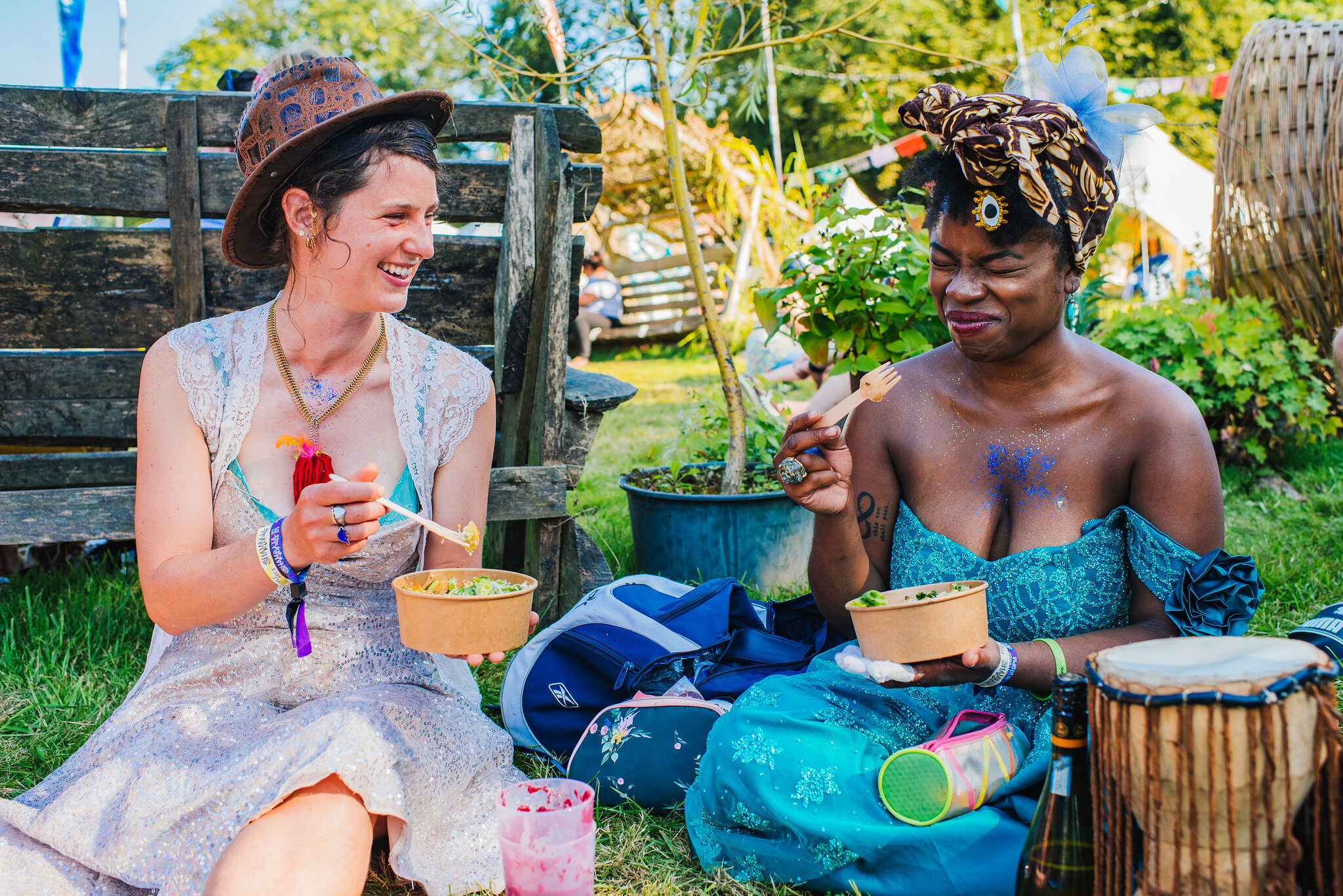
Sustainable Stories: Circular Food Systems
Watch the video

Renewable Energy
- Whilst we used 10% more fuel than 2019, we did increase the overall efficiency of fuel use per person per day (pppd) by 7.7%, due to the increased capacity onsite.
- Our fuel use per person per day is 0.147litres – a solid 70% below the industry average for greenfield camping festivals, which is 0.5litres.
- A major aim and achievement in 2022 has been collecting detailed monitoring data across site (120 x monitors collecting kW hours by day), which gives us the information required to analyse energy usage in great detail and identify efficiency savings for 2023.
- We piloted 3 hybrid battery units this year to learn how we can use them to reduce fuel.
- All of our onsite buggies used non- diesel fuels (except one last minute extra).
- Sustainably sourced and certificated hydrogenated vegetable oil (HVO) is the best non-fossil and palm-oil free fuel option available to us, but there are still environmental impacts such as (low) emissions (at point of combustion) and supply chain impacts, particularly deforestation and social issues (e.g. displacement of affordable oils for local use and use of agricultural land). Our fuel needs to be certified from ‘UK sourced residual feedstock’ (i.e. waste derived) – we’re working on this!
- Our food stalls have achieved a 12% reduction in electricity use compared to 2019 (our last ‘full scale’ year). We introduced charging per kWhour, to encourage reductions, and this has been a success.
Sustainable Stories: The Power Behind Shambala
Watch the video
Travel & Transport
Audience travel to Shambala 2022
This year we sold significantly more campervans and car passes, resulting in a 25% larger audience travel footprint – a whopping 293 tonnes. We think this was at least partly the result of train strikes* at the time, and the rise in campervan ownership.
(*Up the strikers!)
Note: The non-audience travel emissions for 2022 are based on extrapolations from sample data i.e. we take real known distances from some journeys and vehicle type, and apply them to all the travel and transport. It’s a solid guestimate.
Sustainable Stories: Meat & Fish Free
Watch the video
Food & Drink
We manage food sustainability in two main ways
- Our food policy, which stipulates minimum mandatory (plus ‘desirable’) sourcing standards for all food stalls.
- Encouraging traders to use our vetted wholesalers onsite – we worked with Riverford Organics (a workers collective) to provide fresh fruit and veg, Refill Revolution, a local supplier, to provide packaging-free dry foods and cleaning products, and sourced eggs from a local free range farm, so close you can see it from site!
Sustainable Stories: Very Free Range Eggs
Watch the video
Meat & Fish Free
Launched in 2016, this is now a well-established initiative. We surveyed the audience to find out what they think…
Sustainable Stories: Refill Revolution
Watch the video
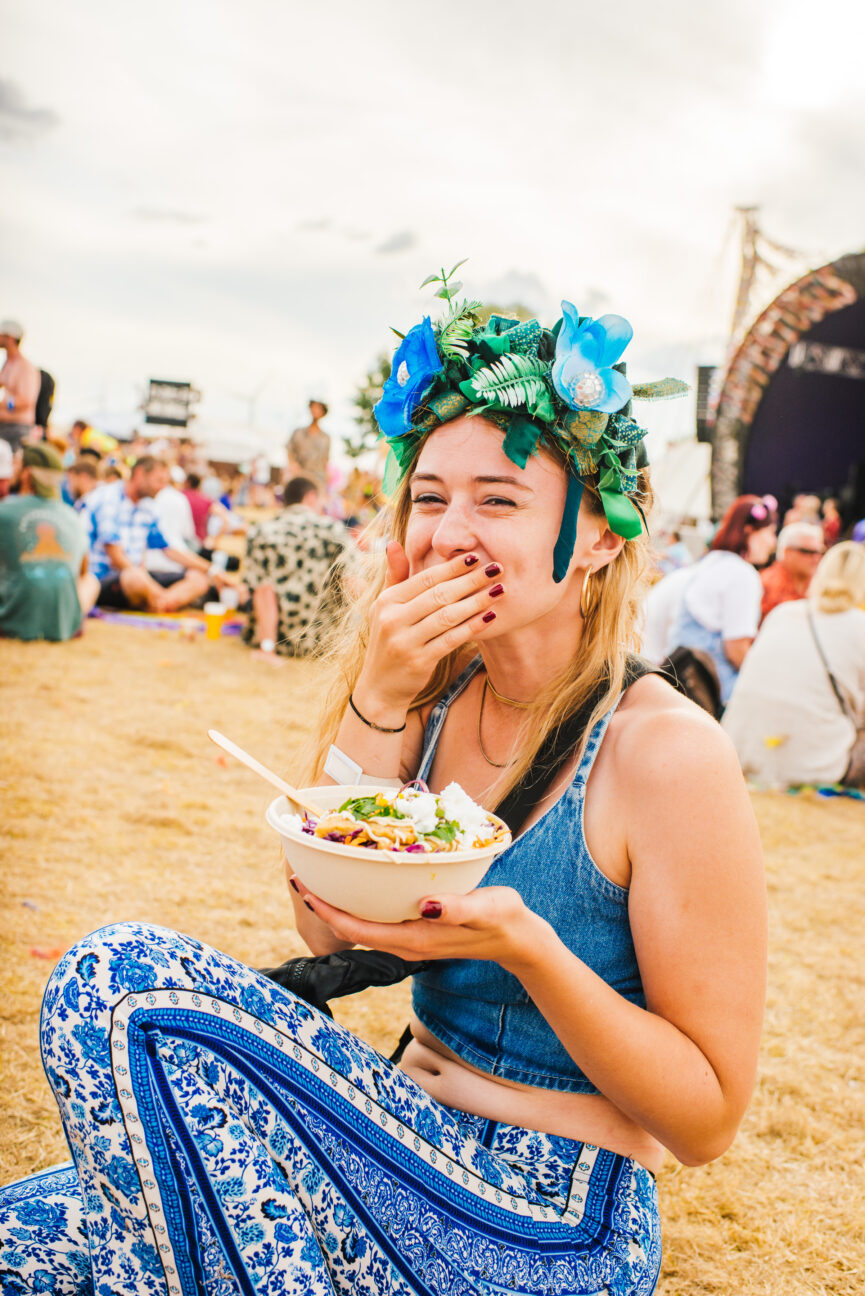
Leading by Example: Crew Catering
Our crew catering is an opportunity to experiment and learn on a smaller scale, before introducing successful initiatives to the festival at large. We work closely with Henry’s Beard (our AMAZING crew catering provider) to ensure the 10,000+ meals they serve are leading-edge in sourcing and impact.
In 2018 we measured everything, to establish the footprint of the average crew meal – the energy used to cook, water consumption, every ingredient, and its weight per meal. We wanted to see how it compares with WWF research suggesting a sustainable meal globally is 0.5kg CO2e. Our vegetarian crew catering menu averaged 1.1kg CO2e per meal! So, some way to go on that one, but it brings up interesting questions around balancing environmental impact with the expectations of hungry site crew.
We have also trialled reusable plates and cutlery, measuring the water and energy use required to wash them up after each meal, compared to compostable serveware. It’s a close call at that scale, but moving to a disposables free world is important, and sometimes we think it’s just valuable that festivals play a role in modelling new ways of doing things for wider impact.
Watch this space!
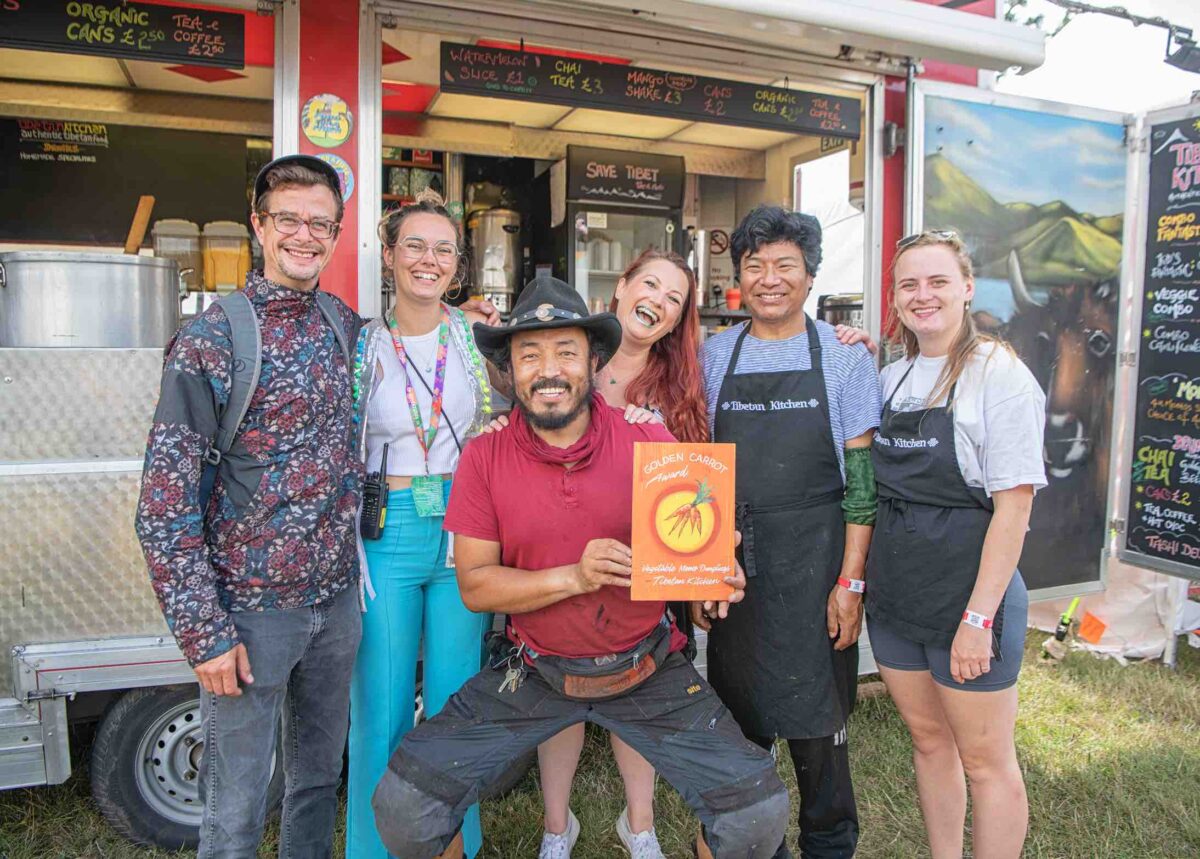
New In 2022!
Packaging-free oat milk: This year we worked with a local grower and producer to trial wholesaling their locally grown oat milk using glass bottles onsite. It worked well, and we avoided 5000+ Tetrpaks, so we’ll be doing this again.
Food impacts: We provided a food carbon calculator to our food traders in advance of the event to understand food impacts and introducing ‘food- print’ impact labelling onsite.
The carbon calculation part of the initiative worked, but the food labelling onsite fell down for a few reasons. Nonetheless, we were able to calculate the five lowest impact scores for on site meals and awarded the trader’s behind them our ‘Golden Carrot’ awards!
Congratulations to these brilliant traders on their low climate impact scores!
- Dosa Deli’s Onion Bhaji Bowl Pop Dogs’ Shawarma Fries
- Tibetan Kitchen’s Vegetable Momo Dumplings
- Mr Noodle’s Vegan Chicken Katsu Curry
- Flats and Smalls’ Za’atar Courgette
Sustainable Stories: Wild x Furrow
Drinks
The products we supply are some of the best available in the UK in terms of sustainability and ethical credentials.
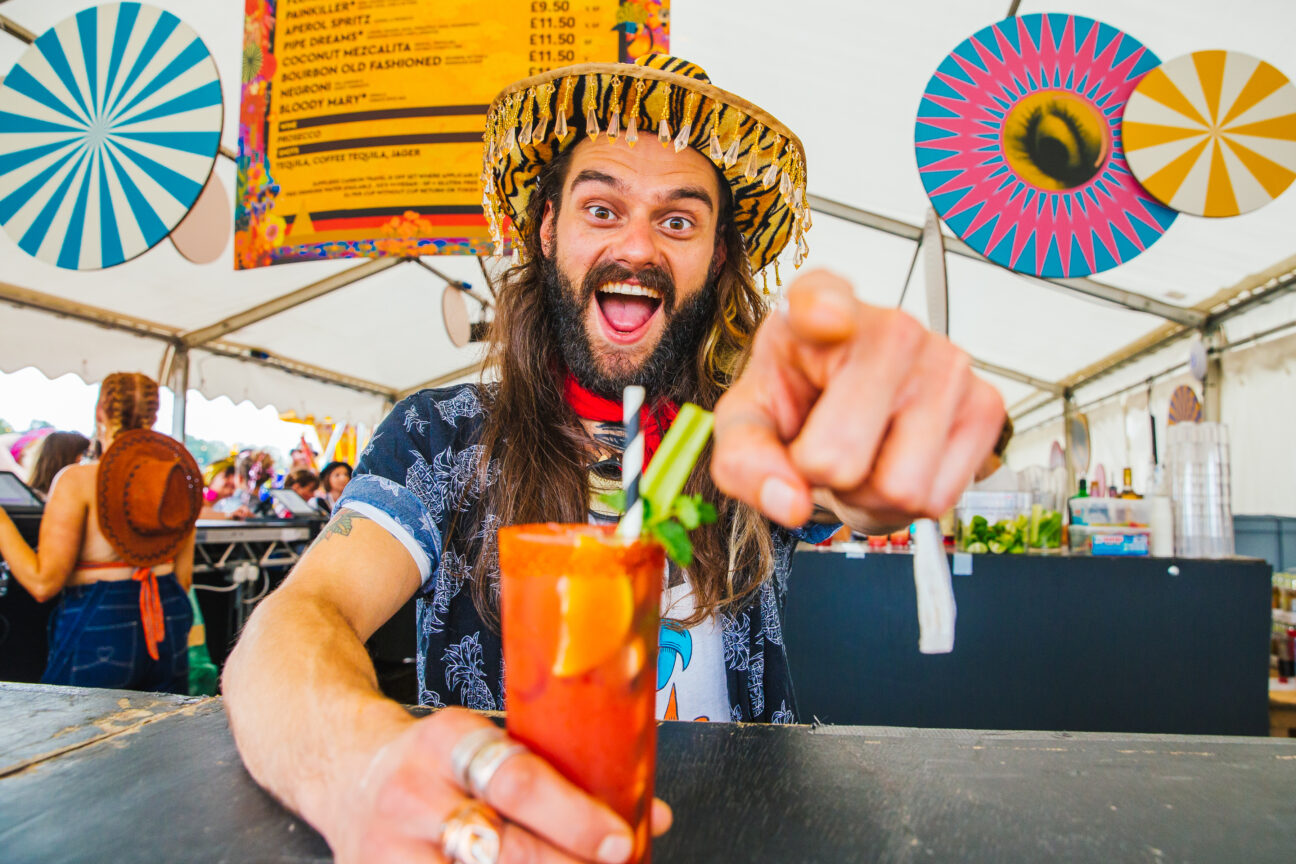
- Our volume lagers are sourced from Lost and Grounded and other small-scale suppliers.
- All our wines are certified sustainable
- Soft drinks are supplied as post mix (avoiding packaging waste)
- 62% of the beer on site (and 80% of the wine) is vegan
- 9 out of the 12 beer and cider suppliers are based within 70 miles of the festival
- 51% of all drinks sold were sourced within 70 miles of the festival
- We continued to only serve the lowest impact plant-based milks with hot drinks across the festival. Check out the Gone Off Milk Report on our website to see our research on this topic.
Equality, diversity and inclusion
Our aim is that ‘everyone feels welcome, safe and able to enjoy their Adventures in Utopia at Shambala, regardless of their background, sexual orientation or ability’. Each year we have a dedicated Diversity and Inclusion Action Plan for Shambala. This includes training for our team and stakeholders, practical changes to the festival, recruitment and communications. We’ve made progress, but there is more to do.
Crew
- We’ve focussed on employing more diverse crew – a first step has been the people we directly employ as freelancers. Our managers onsite are disproportionately female, we employ more people from the LGBTQI community and BIPOC backgrounds than national population averages on the site crew.
- When recruiting for our year round team, we are putting the effort in to reach applicants from backgrounds that are underrepresented in our industry, through targeted job boards such as Creative Access, Run The Check and Creative Lives In Progress.
Artist Diversity
- We’ve been working on the gender balance of artists for our main stages, and recording the gender split for three years.
- We have increased the percentage of female led-acts from 38% in 2018 to 50% in 2022.
- In addition, we are working with creative leaders from diverse communities to host venue and spaces at the festival, such as Hertz so Good, a youth-led stage, and the queer-led SanQtuary venue.
- We have provided online diversity training to our whole community of programmers, setting out clear expectations about the direction of travel toward more diverse acts and crew across the festival. In terms of accessibility, for example, we have provided lists of acts with disabilities to support the process, understanding that our independent network of programmers may not know how to find acts with disabilities.
- Our lead music programmer is actively engaged with the Diverse Artists Network (DAN), the co- founder of which is also on the Shambala programmers team.
Understanding our Audience and their Experience
In 2021 we reached out to historically maginalised segments of our audience (Our LGBTQIA+ community, D/deaf and disabled community and our global majority community) with targeted surveys to better understand how we could improve their experience with us. We then invited these survey respondents to join us in (paid) focus groups.
Whilst we were heartened to learn that the majority of under-represented folks that come to Shambala reported that their experiences with us are far more positive and welcoming than ‘the real world’, or at some other events, there were some clear areas where we as organisers, and you as our audience, could be making improvements to help the entire Shambala community feel more welcome and included.
These learnings were turned into audience behaviour guidelines on cultural appropriation and micro- aggressions which were communicated to our audience pre-event, in our programme and on our app. You can dig into the full Diversity & Inclusivity Report here.
We undertook paid consultancy with Gendered Intelligence -a trans-led grassroots organisation with a wealth of lived experience, community connections and a depth and breadth of trans community knowledge, for advice on ensuring Shambala is a truly safe space for the Trans community – including advise on how best to present and hold Shambala’s ‘free-dressing ‘ institution, Freedom Friday.
We also trialled ‘squatting urinals’ in addition to the ‘usual’ standing versions, which was a roaring success.
Affordability – Pay It Forward: Share The Love Campaign
With the best will in the world, when attempting to make Shambala more inclusive, there’s an elephant in the room. An elephant made of pound coins. Festivals aren’t cheap – especially camping ones. They aren’t cheap to produce and aren’t cheap to attend.
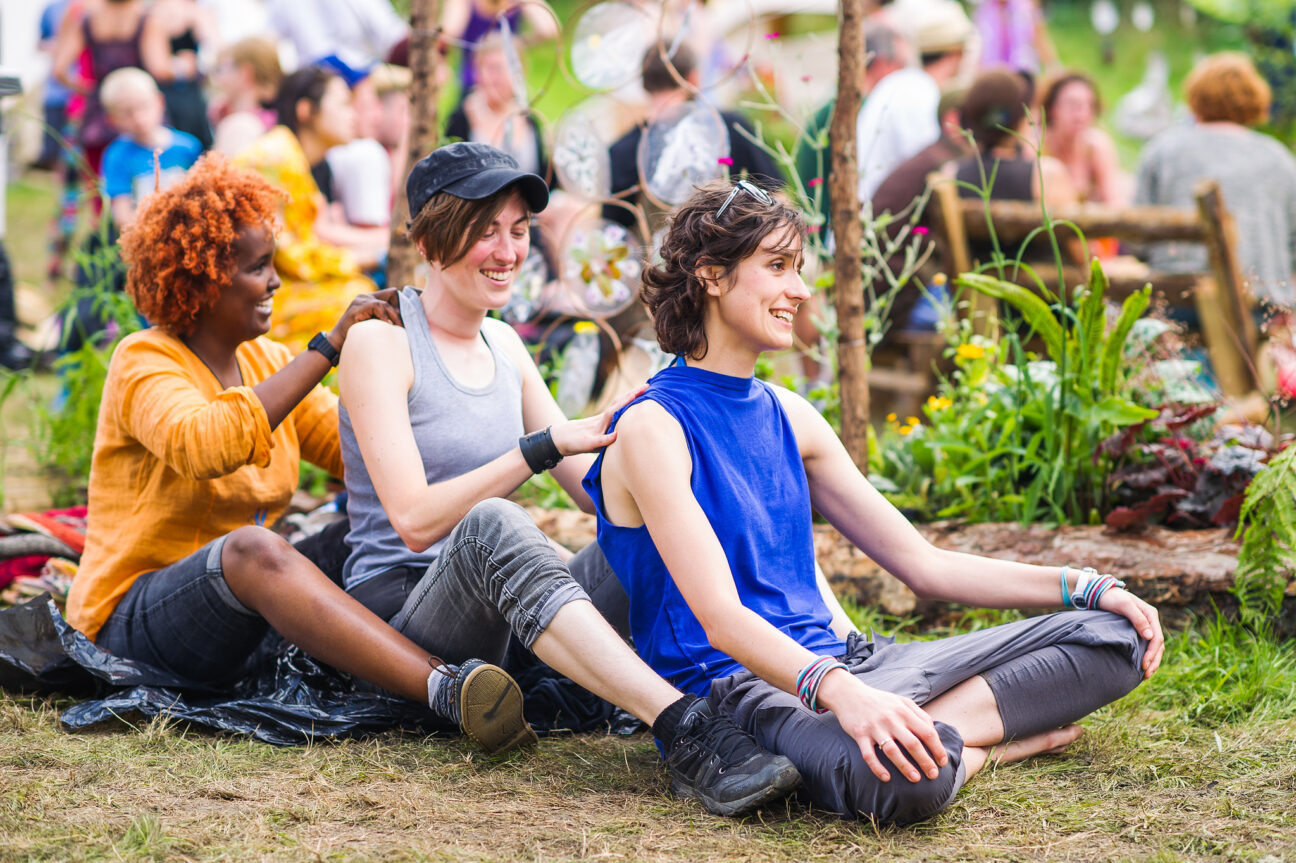
The festival industry has an inclusivity problem because all too often, festivals are totally out of reach to people on low incomes. Saving for ticket will never be a priority when you can’t make rent or put food on the table.
We’ve explored various options as to how we can open up our events to those who are priced out. It’s not as simple as offering cut price tickets for folks on low incomes, because the tickest are just the beginning; the travel, the camping equipment, the food and drink, it all adds up.
In 2022, we kickstarted our mission to raise a pot of funds to share the love in 2023 and beyond.These funds were raised various ways, from donations made by our audience whilst getting their pints in at the bars, to making donations when booking tickets for 2023. With over £10,000 in the pot already, we’re now working with organisations local to our site to identify folks who’d love to join the party but haven’t been able to do so, due to financial pressures, and providing them with full a festival experience to cover all their costs.
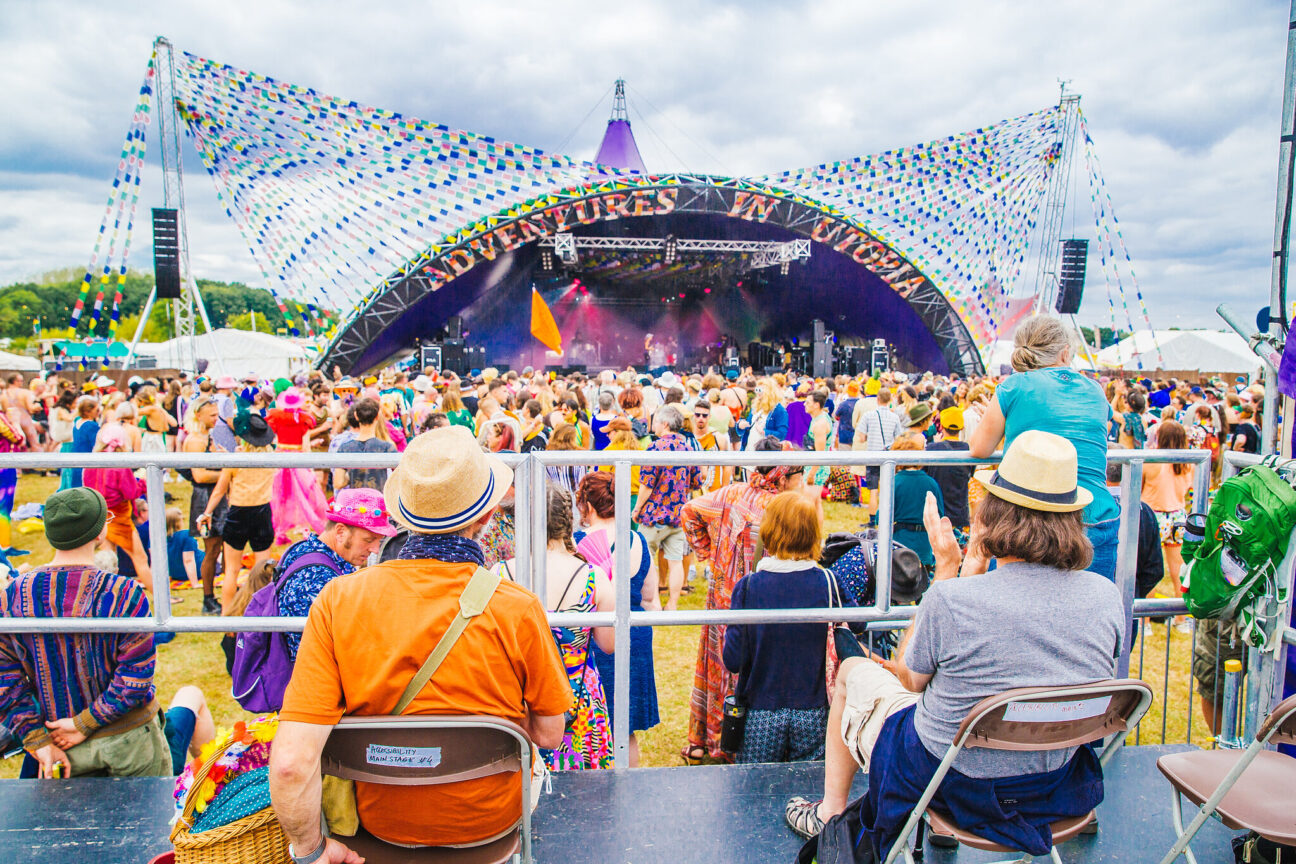
Accessibility
We’re really proud of how accessible Shambala is – we’ve been working on this for more than 10 years.
In 2022 we welcomed 147 folks into our dedicated Accessible Camping Area, staged more disabled performers than ever before, and filmed a ‘visual story’ (launching soon, so keep an eye out!) – to help those with additional needs to get a good sense of what the festival experience will be like before they come.
We train staff in being aware of non- visible disabilities, provide support in advance and offer a range of services onsite from BSL interpreted performances to mobility scooter hire, viewing platforms, medicine storage and personalised shuttle services to name just a few.
GREEN ROAD MAP: 2025
Now then! We’ve covered where we started and where we are now… time to look to the future, and where we go next. CLICK HERE to check out our Green Road Map, detailing how we plan to become a completely regenerative festival, by 2025. Is it going to be easy? Absolutely not! Are we committed to doing it anyway? Absobloodylutely!






